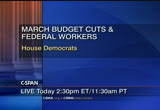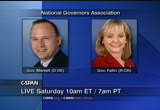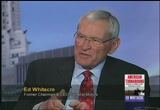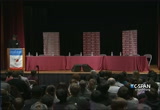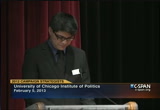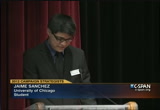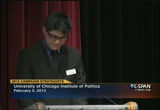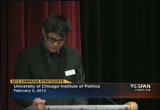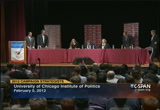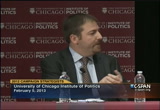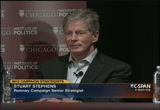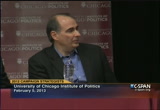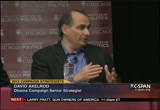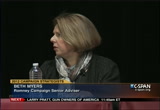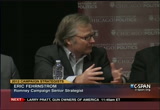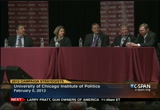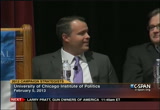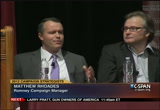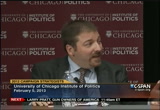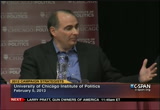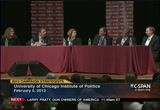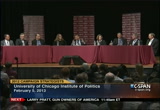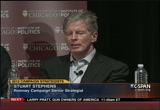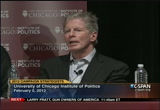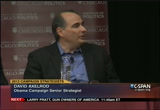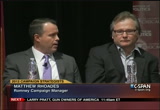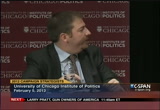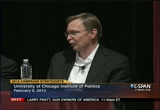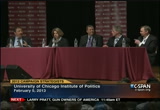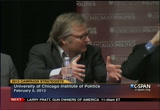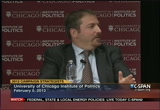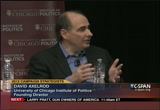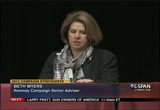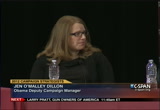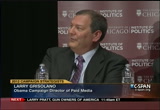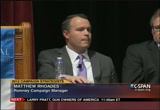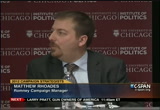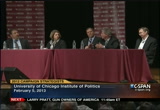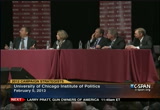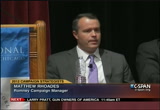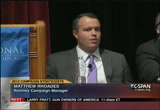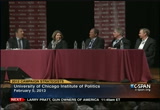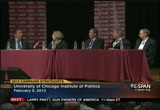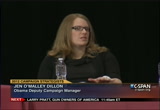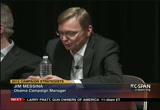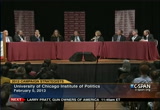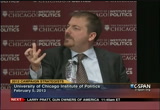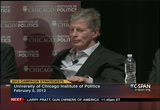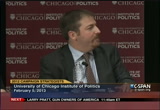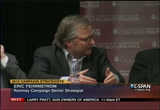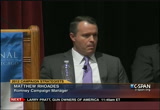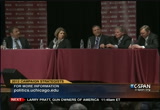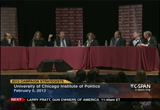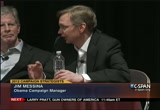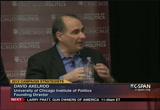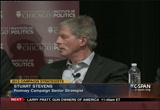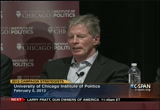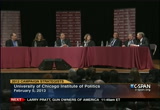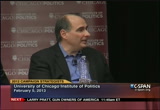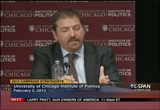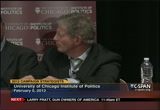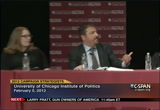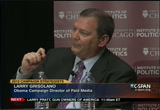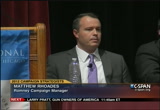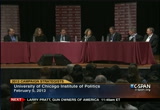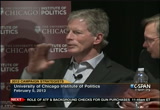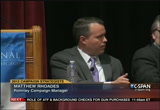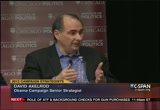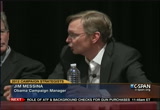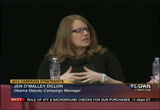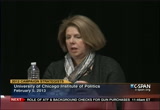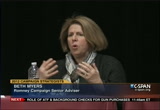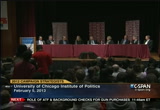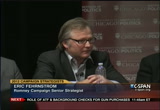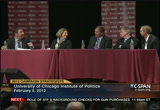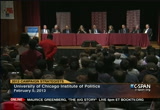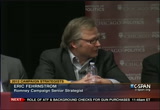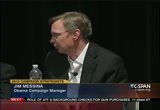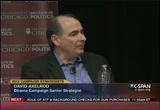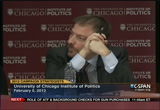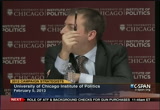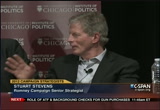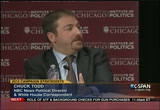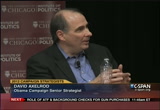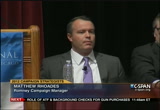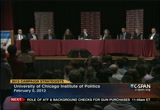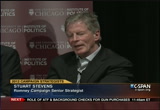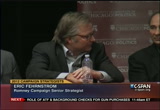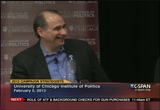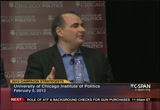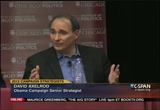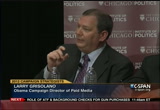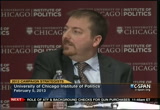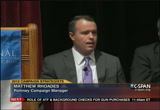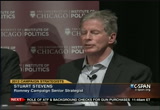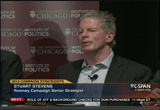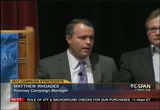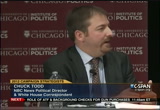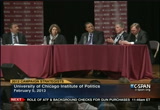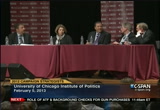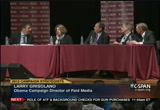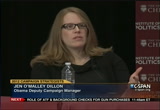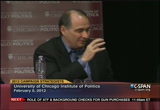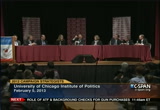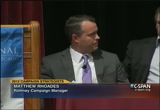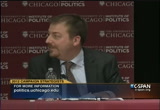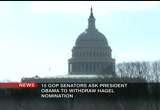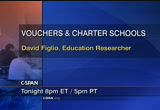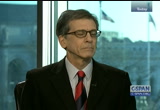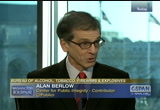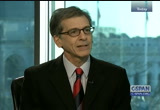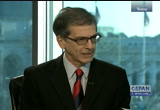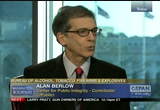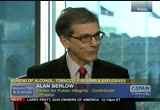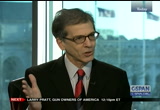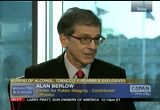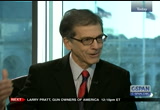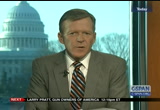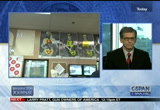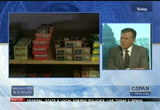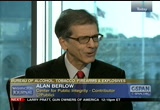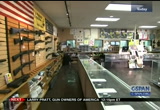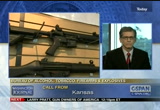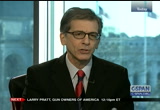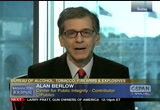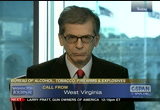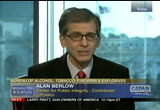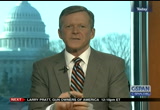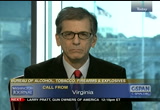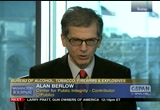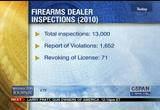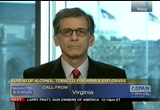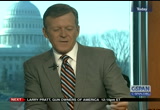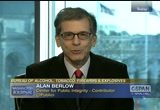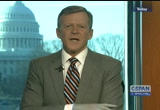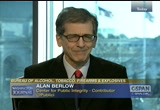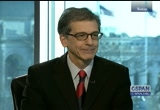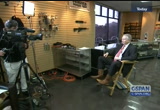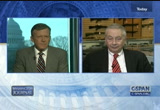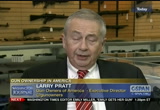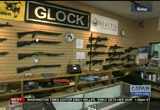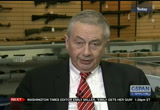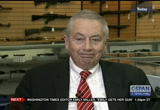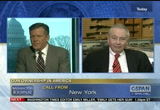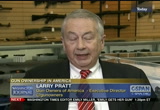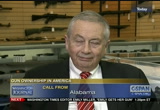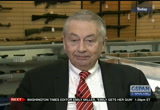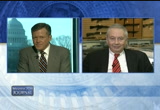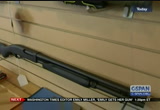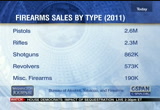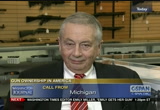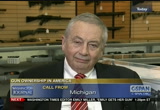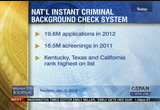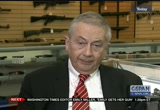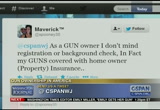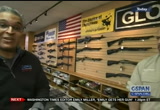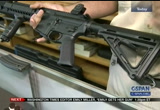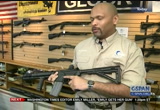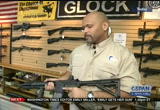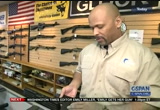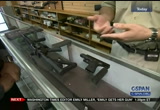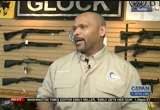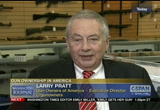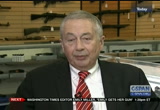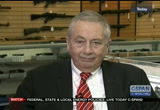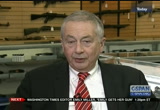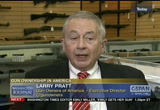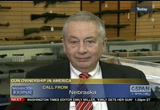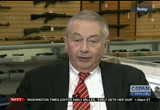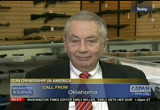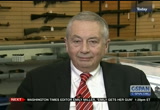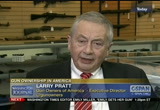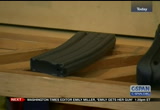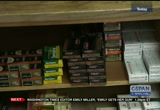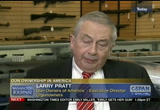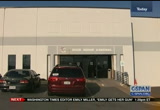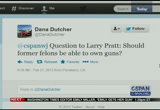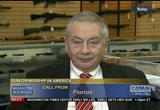tv Public Affairs CSPAN February 21, 2013 10:00am-1:00pm EST
10:00 am
>> of a couple times a week. >> debby stafford, thank you for your time. that is it for today's "washington journal de " we want to thank family miller and our guests for joining us today. we will come your way 7:00 a.m. tomorrow. h[captioning performed by national captioning institute] [captions copyright national cable satellite corp. 2012] >> here is a look at what is ahead today on c-span. coming up at 2:30 p.m. eastern, the house democrats steering policy meeting holding meeting on how the march 1st budget cuts known as sequestration will impact government employees. members will hear from former
10:01 am
federal aviation administration administrator and former illinois congressman john porter. and tonight we will take a look at the issue of school choice, the roles of vouchers and charter schools play in k-12 education. at 8:00, remarks from an educational researcher that discusses the pros and cons and whether vouchers' make a difference in school quality. then after that at 9:00 eastern we are joined via skype by " education week" editor sean cavanaugh. we will respond to your calls, tweets, and facebook comments. this weekend, it is the national governors' association annual winter meeting. coverage begins saturday morning at 10:00 eastern with an opening news conference from nga chair, the delaware governor, and the vice chair, the oklahoma governor, and a discussion on employing people with disabilities. and look at the role of faith in
10:02 am
cybersecurity. start, we toldy the board the approach we were going to take, which was pretty straightforward. remember, we were sent there to sort of fix gm, the board and i. that was the mission, to go make this thing a viable company again. so, we were all focused her and brought the message that we were going to design, build, and sell the world's best vehicles. we were going to move quickly. we need your support. and we need your input. and so, we changed a few things about the board meetings. it was shortened considerably. we stayed away from the details -- or did not get in the weeds on how you build a car. but the bigger questions of financing, more routes, positioning, marketing, that sort of thing. the board was very supportive of that. we kept them informed.
10:03 am
and we just took off. >> leading general waters through bankruptcy and the government bailout, former chairman and ceo ed whitacre on the american to run. part of book tv this week and on c-span2. and look for more book tv on line and like us on facebook. >> a look now at the 2012 election with the top strategist for the romney and obama presidential campaigns. they this -- discussed the primaries, debates, the vice presidential candidate pick, third-party candidates and a number of other topics. the university of chicago institute of politics hosted this event in early february. ch what cuck todd moderates. -- white house correspondent choctaw moderates. [applause] >> good evening. i'm jaime sanchez, the student engagement chair for the student advisory council. we create excitement and
10:04 am
political community involvement in many ways, helping provide avenues for this type of engagement across campus. it has become clear that getting involved in politics is important to fostering good citizens and leaders. many of our students were directly involved with the presidential campaigns of the past year. through internships and going door-to-door, advocating for their candidates. even more students were indirectly involved in the campaigns whether they tweeted, facebooked, everyone knew about the election. in reality, the campaign can become complicated when we zoom out and analyze all of the factors that are required to orchestrate this at a national scale. it is an understatement to say that running a presidential campaign is a difficult piece in the political system. we have speakers who are experts on this trade. in alphabetical order, these are the speakers -- david
10:05 am
axelrod shifted to political consulting in the mid1980's. his role is senior strategist for the 2012 campaign. he is currently the founder and institute director for the university of chicago. institute of politics. eric fehrnstrom began as a reporter for the boston herald. afterward, he became the then current medications director for mitt romney and was a top aide in strategist for the romney campaign. larry grisolano has been involved in politics and campaigns for the past 30 years. he has been involved in some of the most important political battles both in 2008 and 2012 elections. he served in the obama campaign.
10:06 am
jim messina quickly rose to prominence across the country. he became the obama deputy chief of staff for 2009 and went on to become the manager of the obama reelection campaign in 2012. beth meyers work for reagan's campaign in the '80s and has been involved in politics ever since. she worked with governor romney where she then served as his chief of staff and was a top adviser for the romney campaign. ms. myers is one of the inaugural fellows. for the institute of politics. general dillon -- jenna dillon --in 2008, she served as a battleground state erector for the obama campaign. matt rhoades has been a lead
10:07 am
strategist for the republican national committee. he was a research analyst in the 2000 elections. he was the director of research for the 2004 bush campaign. he was the campaign manager for romney. stuart stephens has gone on to elect more governors than any other current republican media consultant. he has also worked on campaigns overseas. he was involved in that media image for romney in 2008 and was a senior strategist for the presidential campaign in 2012. finally, our moderator for tonight is mr. chuck todd. he has experience as an editor and is an on-air political analyst. he is the current role of the chief white house correspondent for nbc. the panel will cover the 2012 election and campaign on a macro level and we will shed the light on what went right, what went wrong, and what went
10:08 am
unexpectedly. we would like to thank strategist for giving us to host them. -- strategist on governor romney's campaign for giving our institution the privilege of hosting them. the caliber and expertise of the guests is extraordinary. it is an honor to introduce all of them for what should be a fruitful discussion. ladies and gentlemen, thank you for coming. please join me in welcoming our distinguished guests. [applause] >> am i supposed to begin? all right.
10:09 am
so, i'm a little concerned. eight people, 90 minutes. i think matt said, it is like another republican debate. [laughter] we will do our best. do not suck up too much time. want to hear from everyone. i want to begin with -- when did someone decide to run for president? how does that conversation take place? i want to start with stuart. when did you have the conversation with governor romney? a lot of us assumed he was running for president the whole time. when did he decide to run? when did he tell you? when was it clear it was time to go?
10:10 am
>> there is a great misconception that he land immediately afterwards. -- planned to run it immediately afterwards. this assumption was that the economy would continue to improve or would improve. i think running and losing in 2008 was liberating for him. he found that he could be happy. we kept talking. he wanted to talk about it. we had a busy 2010 client schedule. he finally said, on election day 2010, if you cannot do anything for your client, why don't we meet?
10:11 am
ok. we can do that. my partner and i met him. we met him in boston. at his condo. that was when i got a sense that he was intending to run. >> he was serious? and he made the decision? >> yeah. >> covering the white house, he always viewed mitt romney is the face of the republican party. is that unfair? >> no. after the 2008 election, we were thinking about the future. he asked me who i thought the nominee would be in 20 20. i said, mitt romney. i knew we were heading into an
10:12 am
economic maelstrom. i spoke earlier to a group about this opposites theory of presidential races. romney and the business background seem like the kind of person who could emerge from that. on election day, that election -- the election day of 2010, that election sort of altered my thinking. it was clear he to me that there were forces in every public and -- astride the republican party that would control that nomination process. it would be challenging for any nominee to navigate those forces. they would have to make difficult choices in order to be the nominee. there was an element of doubt. that was injected by the 2010
10:13 am
race. we did think it was the likely guy. >> was there every sign you that he would not do it? -- time he thought he was not going to do it? >> yeah. he had really relaxed in 2009. i am not sure i would have gone to say he is not going to do it. ann had a health scare. mitt is not going to do something if her health is not good. so, 2009, who knows. he was enjoying writing the book. the time that i came to think that he was looking to run was right after the scott brown race when he sat down with eric and said we need to get another person. let's talk to matt rhoades. i thought that was a pretty good indication that he was very serious about thinking of running. >> i was with governor romney in 2008 during that
10:14 am
presidential campaign. -- when he withdrew from that presidential campaign. on the plane back to washington, -- back to boston, he was busy trying to arrange people's lives. he did not sound like a person who was plotting another run. he seemed exhausted by politics. but then there were developments that happened. not only the scott brown race, butthe chris christie victory in new jersey. bob mcdonnell victory in virginia. seems like republicans were on a march and playing defense on -- and the president was playing defense, particularly on issues relating to the economy. which was deteriorating. i think mitt felt in 2011 that he was compelled to get involved. because he felt he had something
10:15 am
to offerwith respect to his skills and jobs and the economy. that is why he got in at that precise moment. -- was there a precise moment? >> when he said the light switch went on? >> i do not think so. it is a process that happens over time. there are a number of factors to take into account. but by the timematt came up and we knew that he was moving in that direction. >> you are in the white house. you're a political junkie. a campaign junkie, first and foremost. what was your -- did you find yourself obsessively following romney and the republicans? take me inside the white house when you guys would have the discussion. >> i think david has it right. we thought for a long time it would be romney. we would rank a republican from 1-10. romney never went below number
10:16 am
one. we always viewed it as him. you could see him make the steps. i thought the book was really good and smartly done. you could tell, we thought, he made a decision he was going andhe would be a formidable candidate. we would say to ourselves, can it run me get through this primary? it turned out to be longer than we thought -- you can mitt romney -- can mitt romney get through this primary? it turned out to be longer than we ought it would be. >> what is an interview like for mitt romney? did you interview him, and what were some of his questions for you? >> the first shot he called, it was february of 2010 -- >> it was that period when it was getting hit by those brutal snowstorms. i remember there was plenty of
10:17 am
snow out there, even more than chicago has today. it was not an interview as much -- he was asking whether or not i would come up. and do thenhe was talking about taking itpac and talking about picking it up a notch. little bit different -- presidential campaigns are a little bit different. you go through this period were you think about running for president. that is almost more important than the day you finally come to the conclusion, i will run. he wanted did take it up a notch. he had a book that he was about to roll out. i came up right about that time very -- that time. he asked me that day. when someone offers you something, you have to say, i have to think about it. imagine any other answer i would give the next day.
10:18 am
the next day we were off and running. it all just happened. but the time i became campaign manager, i do not remember sitting down and having a formal interview. >> suddenly you are hiring people? >> for better or worse, a kind of happened. >> david and jim, when did you go into re-elect mode? in some form or another? >> it is sort of a sensation that got us going. -- sensation of getting bombed -- bottom that got us going? >> the 2010 election? >> no, the debt ceiling fight was -- we obviously, there were thoughts given to the real that -- >> when did you move? >> february 2011. >> but it kicked into high gear and that is when everybody -- the gym was putting the mechanism in place, putting the
10:19 am
mechanisms in place. we were doing the early things that had begun. but i think everyone got very, very focused, at least on the message side. that was a line of demarcation, the debt ceiling fight. our numbers were as bad as they were throughout the whole president's. -- presidency. the creditors and washington were swirling around. all folks were nervous. and it was clear that we were now in a situation where we had to fight and we had to pull out of the nose dive we were in. but the mechanism was already -- there were mechanical things that had to be done. one thing we do is they were going to have a big primary and we would have time to put things in motion while they were busy that would ultimately redound to our benefit. >> take me through when you
10:20 am
guys started operationally -- part of it is just, what you have to start the things to build the programs? >> i was at a dnc for 2009-2010 support of the work was building the foundation of what we knew would come for the reelection. while it was not a permanent campaign, there were a lot of things under the radar, the analytics. building on some of the internal polling that we did, really holding the 50 states strategy and having staff in all the states and training volunteers to give them what they needed to empower them. in an off-year a president normally would not have done. all of this data pretty quickly after the president one day this first election and we built off of that. >> when did you start to build the infrastructure? >> i showed up in april on a full-time basis. and we really started -- this was at david's insistence -- which started very early, april
10:21 am
and may, doing very intensive research to try to get a handle on what people were thinking out there. this was before the debt ceiling stuff. but we knew people were weary of the economy. it was a weary electorate and we wanted to see how we fit in, how they were following what was going on on the other side. by the time the debt ceiling hit, we had a pretty good sense of the landscape and sort of what our way was, the kind of move. the debt ceiling was a moment in which we were kind of galvanized -- sort of the cohesion to move forward on the things we have been learning over the summer. >> what was your son -- assumption about what the primary would be about before the announcement speech? you guys were preparing the announcement speech and writing all of that, and i would think the public and media did not understand how important they are. you go back to obama's
10:22 am
announcement speech in february of 27 -- 2007, he lays out the whole message of the campaign. what are your assumptions as you are working on it, the governor working on it? >> we talked about it a lot. peter was very involved in that. we have a premise that we wanted to have announced the speech that you could give the day before the general election. that was our goal. be th went -- i think beth went and dragged up the reagan speech and we used it as a model, one that was successful. a model of a speech that president reagan, a candidate reagan, could have given the day before, in 1980, the general election. we always believed that we had to force the primary to be about the economy, and that mitt
10:23 am
romney was going to be the candidate of the economy. and to beat mitt romney, you had to beat him on the economy. every candidate would have to be able to trump him on that and we were fairly confident of candidate would be able to do that. and that the process of the primary was going to be a referendum on who was best suited to defeat barack obama, to base barack obama. not in electability sense but in a thematic cents. in that sense, the primary, as much as possible would not be one where you go off and spend the primary talking about x, and then have to shift and talk about y in the general election. that was a theory out. if you go back and read the announcement speech, it was a
10:24 am
speech he could have given before the general election. >> larry mentioned the formative research we were doing. i think we all would agree that we all believed the race was going to be about the economy in some form or fashion. the question was, what was the definition of what the economy was. in all the research we did in the spring of 2011 was largely about the way people saw the economy from their own experience. and this general sense of embattlement that the middle class felt. and a real anger about government, yes, but also about wall street, anger about the four said they felt were conspiring against them. so, we knew that we had an objective, too, was to define in the economy in our own terms and to wake up with a sense, and all
10:25 am
through the race to the last day, the definitional fight about what the economic challenge was essential to the campaign. >> matt, who did not run that use war was going to run and you were preparing for? -- that you swore was going to run? >> i know what you want me to say. but you cannot worry about who is not -- >> was it -- remember that whole -- >> i said earlier sometimes it is more important you begin the process of thinking about running for president. but when you are in a primary, you cannot worry about who is not in the game. people came to their own decisions whether or not they were going to get in the race. to sort's point, we were going to run the primary race we were going to run the matter who got in. winning the nomination is always tougher than anyone thinks it is, even if there is a front
10:26 am
runner white out in front. i saw how brutal the primary process was being the communications director last time. i had the opportunity to work with president bush in 2004 in his reelection. we had a lot of opportunity to look at that field and study it. we always thought that john kerry, if we were to put the rankings together, john kerry would also -- always be on top. there was a period where mr. dean came out of nowhere. there is always the inevitability of something happening in the primary to shake things up. but if you sit around and worry about one individual getting in over another -- it would not have impacted the race we ran. you cannot sit around and worry about people not in it. >> did governor romney ever express to you, boy, i wonder if somebody will be getting in? why is he playing the game? >> he would speculate on people but i think he felt the field -- rick perry got in late.
10:27 am
and somebody said there was someone else would be in the race. did not know who it will be but there is turf out there. when perry got in, that is one rethought -- >> anybody run, jen, you did not think would run? on the republican side. i know there was a moment -- i certainly believe there could have been a third-party candidate. >> i think matt has it right. you look at who is in the race and prepare for them. but i think we all believed mitch would run -- >> daniels. like looking for a way to run. >> you could see how it would be a big problem for these guys in the primary. there was some intellectual space. he is a really smart political operative and you can see him try to get there. i think we spent some time thinking about him. >> did governor daniels -- i
10:28 am
mean, he was openly talking about other people getting in, in a way i am sure cannot make you guys have. eric, do you remember governor romney calling governor daniel setting, are you in or out? >> no. we did not sit around our headquarters and fret about who might get in the race or might not. there was a great deal of speculation and the media about potential candidates, third- party candidates, but it never really influenced our thinking one way or the other in terms of the type of campaign to run in the primary. >> in the days before announcing -- you guys did the health care speech. >> before. >> a couple of weeks before. explained the thinking behind -- why you felt the need you had to do it when you did it. >> the question of whether and not give there was a lot of pressure internally in the party.
10:29 am
whether or not the governor would change his position, or by what his position would be on the health care. it was important to get that off the table. go out and say what it was going to be and let the chips fall where they may. >> eric, do you feel it got off the table? >> he became the nominee. look, health care was one of the major obstacles to the nomination that we had to wrestle with because of what mitt but employees in massachusetts also resembles what the president did what the national health care plan. but we thought there were some very meaningful differences. i mean, everybody wants to extend health-insurance to more people. the question is, how you would finance it. it the way we finance it at the state level is we took a pot of money going to hospitals to reimburse them for pre-care -- mitt said, why don't we repurchase the money, every directed and use it to subsidize
10:30 am
health insurance for people who need assistance, financial assistance, in buying their own coverage? that is very much different than the financing mechanism in the president's healthcare plan. we thought it thought that was . [all talking at once] >> that is not a pejorative. [laughter] >> we had the primary electorate get -- electorate, but i think it was persuasive what the economic situation is going to be. in our view, romney had superior job creation skills. >> finding ways to talk about romney and health-care. you guys were in a bunker on healthcare. it was -- is that fair? >> we did everything we could to
10:31 am
help him talk about his record. [laughter] we admired what he did. >> it was obviously strategic -- any time you were going to talk about health care, you're going to talk about mitt romney. >> we wanted to make sure that people understood the similarities between the two plans. it was an easy place to go. >> it was also particularly important to do that while he was involved in the republican primary because one of our objectives was to make the process as long and challenging for them -- understanding that he would probably be the nominee. anything we could do to create a mistep was good. there is no doubt. i think these guys carry it as well as they could. much of the republicans were built around the opposition to
10:32 am
this health care plan. in was a natural thing for his opponents to -- it was a natural thing for his opponents to attack him for. to mean that seemed you were waiting as long as you possibly could to engage the republican primary opponent. you engaged on a staff level. >> the debates, i think. that is when we looked at the calendar. this is another story. >> and one of the things i want to add -- i want to ask about reforming the process. everybody. >> but we looked at the calendar, and it was the september -- three days in september. at that point, we were engaged. that was when i thought we prepared for that and went all
10:33 am
in. >> and come up so come but they are having a primary. did you use, jen, the debates as a primary organizing tool? >> they wanted to get involved, see what issues were being discussed in the primary, and represent what they felt was important. at the same time, we did have early on a lot of our folks saying, we will be all right. >> the primary debates were taking the voting to bar. >> exactly. we were facing apathy. they felt like, he was going to be ok. they would support him, but they did not need to get involved as early. >> that is exactly right. two words stick out -- michelle obama. we put her out there and a big way and she really motivated
10:34 am
our base. into the spring, when you guys could going longer and longer and longer, our people kept saying, especially online contributors were like, wait as up when you need us. -- wake us up when you need us. >> what are you doing on these debate nights that were the national conversations on policy, but on one side, what were you guys trying to do? >> it was an opportunity to kind of enter into the commentary and share our pokes and jabs underneath. it was also a chance to see how the message was unfolding. there are things said in the debates that we kept good notes on. later in the campaign, we used those. >> matt, you have been quoted before about the issue of immigration and going after rick perry.
10:35 am
do you still stick by what you did? [laughter] the campaign. do you think the campaign overreacted to rick perry? >> look -- >> on the issue of immigration? >> to win your party's nomination, stuart says you have to go out and take it. in the early steps of the primary process, rick perry was a very formidable opponent. you have to look at who that individual is at that point in time. we were running a campaign based on jobs and the economy. this is the governor of the state that created -- some would say every single job in the entire country. we knew he could get into our space. we started talking, that is where we started -- we did some
10:36 am
candidate contracts in those debates. >> very early, it seemed like. >> and began with social security and his position on social security and what he had written about social security and his son buck. >> key came out -- he came out against it. >> he used the phrase "ponzi scheme" in the debate. [laughter] by the third debate when we opened up that flank on immigration, i think that we had already tugged at this drain on gov. perryt. he string on gov. perry, and we did not need to go into that space. i stand by what i said. >> he seemed to be helpless. >> once you knew you had dispatched rick perry and it was going to be someone else --
10:37 am
>> i think that governor perry was a very formidable candidate. >> he was the only one who had the ability to be you? >> no, not at all. i think there is a great under appreciation for the quality of the candidates who were in the primary. i think that for the republican primary voter, senator santorum was much more in sync with the base then senator clinton was with the democratic party base. she was a pro-work candidate in an inside or party -- a pro-war candidate in an anti-war party. >> what you think it santorum had had perry's early money?
10:38 am
>> what we know about the republican party? what we know about mitt romney? >> moderate mormon from massachusetts, right? >> i think it is a testament to his political skills that he did not begin with a natural geographical or ideological base. but he was able to shift political skill to taking positions that in many cases people disagree with. like health care. but to convince the republican party he had the qualities that they wanted to be his nominee. >> it is pretty dicey where every week there was a new w hack-a-mole conservative challenger. we went from rick perry to herman cain, and then there was
10:39 am
that moment where he blew up at the bloomberg debate. who were these voters? not who were they -- but it started with trump and michele bachmann. it seemed like it was the same 20% of the electorate. >> i just want to add, you know, governor perry was obviously a formidable. senator santorum, anyone who underestimates his ability to earn the nomination -- so much of running for president, the guys and gals who tend to be in the later rounds, senator santorum certainly has the work ethic and the commitment to go right to the end. governor pawlenty, on paper, an incredibly formidable opponent. >> the minute you say that, michael -- that is right [laughter]
10:40 am
>> if we go later on in the primary process, gov. pawlenty could take away some of the votes we were going to garner in a place like illinois, for example. when we won the illinois primary, we won because of chicago. then you mentioned the fact that -- i do not even know. 22 or 24. 24 sounds better. >> 21 were on these horrible network steeping be three or four good ones were on nbc. i do know that. [laughter] >> speaker gingrich was in all of the debates. he is a pretty formidable debate and at. this field have a lot of quality contenders. no matter who was in the field, you have to go out and take the nomination. someone is going to be anti-
10:41 am
mitt. you had the anti-bush in 2000. that is just the way that politics is. people in the campaign were not completely ready to close the deal and go shopping elsewhere. i think during the course of the primary, our campaign did a good job playing whack-a-mole. >> i want to give you credit. i remember one of the best e- mail exchanges i had -- you would say, who is going to pop in iowa? and i would say come on. >> we were running up against a lot of people who were not even in the race. >> your the one guy sitting this early on. >> he is an immensely talented individual. i think the impact of the super paca in a long dating this
10:42 am
process -- the super pacs in elongating this process is important. campaigns never end because they want to and. bay and because they run out of money. nobody wakes up in a campaign headquarters and says, you know, they can keep the lights on, they cannot keep be a heads up, they cannot face staffers. elongated this race in a way we have never seen before. romney obviously had super pac help. without a super pac, gingrich would not have gotten their. >> i cannot game this out, this or that.
10:43 am
i think overall, it serves to keep candidates alive who did not have the fund-raising ability otherwise. which is why campaigns in. i think that is a really important point when you study the process. what was new about this cycle. >> and you guys think it made a decision, jen, to go to the super pac grounds. when did it hit you? when did you decide you have to flip-flop on super pac's? >> i think david can speak more to this. the system was set up in a way where we had to make sure we were fighting against what was coming at as. the biggest lesson i learned in 2010 was, on the other side in terms of the super pac's, they were incredibly coordinated, incredibly sophisticated. they all had money and they all had very coordinated messages,
10:44 am
and that really hurt as in 2010. >> that grandma could get pretty negative. >> exactly, exactly. >> when you guys came out with the policy initiative -- no on super pac's, there were a lot of democrats complaining you would get that call. but now you have ruined super pac fundraising for the entire democratic party. >> two things. i think that policy was a mistake we made. at that point, it was true to who we were and what we were. they said there were going to do this thing and they were doing their super pac thing, and it was winter. >> if you were running a democratic super pac. >> two former white house staffers. hoping they would get less. but there was an explosion of
10:45 am
republican super pac's. so one day i did around of calls and i wrote on the white board how much i thought they were going to spend. the number was $660 million on the super pac's. david looked at that and said "we need to have a meeting." >> the reality is, you cannot live by two sets of rules. looking at his white ford was a chilling experience. -- looking at hiswhiteboard was a chilling experience. getting back to stuart's point, they write a $10 million check to newt gingrich, who is flat out, busted, broke. flat out, busted, broke. and one died wrote a check and
10:46 am
he is back in the game. >> how did you know you had to be in the super pac game? that you had to have one? was there ever a doubt that he were going to do this? >> i don't think there was ever a doubt. [laughter] >> was it out of necessity, or did you see it as a strategic advantage? >> it was just an inevitability. jim got the luxury of pushing it off, that decision. >> did you figure they would come to that decision? >> yes. >> when they saw the amount of money. and you guys knew you had to do it from the get go? >> well, we did not do it -- >> what was so weird about this, there was some coordination, but it was not coordination -- >> you could communicate 120
10:47 am
days before the first broadcast advertisement went up. it might have been 90 days. >> 90 days. >> and we did not have much, you know, very much by the rules the up bud's the -- ,, but campaign insisted. >> i think this whole question of the impact of these new rules is something that is greatly underappreciated. it is also the first time we have not had federal funding. the incumbent on either side -- in 1976, post-watergate, we knew the incumbent presidents were greatly advantaged, because you have four years to raise all this money. we had $1 billion, which was the
10:48 am
amount of money we knew the obama campaign would be able to raise as an incumbent president. so, the system is in a crazy -- >> just to give you guys an idea, i want to throw some numbers out your. bush 2000 -- bush and gore, after the convention. he spent $64 million. i believe that was one week of advertising in the month of august for both sides. that was not that long ago. and the word got out on bush and gore, if i'm not mistaken. people realize. [laughter] anyway, the astronomical -- >> [indiscernible] >> i want to go to this before we go to the general election
10:49 am
ann romney folks. what was the scariest moment in time? where were your thoughts "we might lose this thing?" was that the michigan primary? what was the o.s. moment? >> i do not think we were ever in fear of losing it, but ofo.s. -- but the o.s. moment was south carolina. >> losing it, or the margin? >> getting newt gingrich back into the game. he was baiting. he got that check from sheldon. he it outperforms in south carolina. we never thought he would crack south carolina. he performed better in 2012 than he did in 20008. it puts newt in the driver's seat for a time and it really
10:50 am
forced us to turn on the jets in florida. >> any other moments? >> i would say little later on from a budget standpoint, what i was responsible for, there were moments for the long claw, which is what we call the primary process. there were some big states that caused a lot of money. there were moments in our campaign where we took our bank close to zero. when you do that, there is a lot riding on you performing well in that state. week after week. we must win it states. you have to make a decision from a budget standpoint. start to think about staffing. and that is just that -- these people are human beings and it is brutal.
10:51 am
i would say that was the most brutal par. >> this was supposed -- post- michigan. >> south carolina was great. it was like, let's go down to florida. >> i would say, when we lost denver, colorado and missouri. it was totally o.s., because it was like, we are going to have another month of this, really? i realize mitt is the kind of candidate who could come back in florida and had a long ball and do good. the lots that i just met we are going to be -- >> in the ground game? >> yes. >> stuart? >> losing michigan would not have been a positive experience. you know, the media had seen it
10:52 am
down, and it was a very expensive state. it was really hand to hand. you know, we did not win it by a landslide, but we won at. >> larry, is april. you wrap up the nomination. if there was a jobs report, and they were in the toilet, if i'm not mistaken, april 2012. did it surprise you, larry, how fast the party rallied around romney? every week, we were keeping ourselves away, let's see what happens in this county. >> no, we are such a partisan
10:53 am
country in the electorate, we never thought after this thing that the non-romney primary electorate is not going to galvanize. our theory all along is there is this narrow little band that will decide this thing. there was never any doubt the party would consolidate quickly. >> was the plan always you guys would do the formal roll out. whenever they were done? if they wrapped in march? >> we knew we were going to go. when you exactly when we were going to do. we have that plan done by the end of the year. our. o.s. -- our biggest o.s. moment was, what if they ended by new hampshire? we wanted them to run long.
10:54 am
>> that was a good moment. >> we built around that for months in advance. >> as far as the media, we thought we had the resources to start running media in may, but we wanted to hit all at once. >> you guys assumed the minute that romney got the nomination, super pac attack ads would start in next day. >> we thought super pac bass -- our greatest fear was that super pac ads would start in january and february and march. we were really not prepared to deal with them. to this day, i am still confused as to why it did not happen. if i am running a super pac that is not affiliated with one of the republican candidates and i see what is going on with republican side, i am saying to myself, i need to provide cover
10:55 am
here because the president is getting a free pass. >> stuart? there was no coordination, because you're always wondering where were the attack ads in april? >> i think the impact of the super pac ads is a fascinating subject. >> you are doing a whole week on at. >> it is a beginning new development like machine trends. these things, what worked and what did not work. i think that what we discovered on our side, to our surprise and disappointment, was that there was, i think, some superb super pac ads done for romney, but the impact that they had was not on the voters. it was not what we would have expected to have.
10:56 am
you can analyze this. the most obvious answer, i think, is because it was not coordinated with the campaign. ads work best when you coordinate with the campaign, when you roll it out with your press and your apparatus and back up the ads. they could not do that, because they were not coordinating with the campaign at. and they were not coordinating with each other that much. so, they would make different ads which would be good, but they were observed, and they were not testing one message. so, the obama campaign outspent us to to one in advertising. -- two to one in advertising. you can say that was supplemented by super pac adds, but that impact was not what we
10:57 am
thought. >> i was reading an interview with the running mate in richmond. you guys announced -- i assume that you were not ruling out the president endorsing a marriage, that was not the blowout plan for the first week of the campaign? >> that is fair to say. [laughter] >> that was not on the whiteboard. >> david, talk about that. it was the day before, and you pre-taped biden. he comes out for gay marriage. where you guys aware of how this would end up? >> yes. it was pretty clear what was about to happen. [laughter] >> in a sense, we get a campaign, and this is not the
10:58 am
message you plan on taking off on? >> it was -- it was challenging. but it also was true that we all knew, having talked with the president, that he was going to make that, he was going to take that step. yes, we would have taken it in a different -- >> before the convention? he wanted a convention byte, not a platform byte? >> he was ready to do with. he was going to get a question. yes, it was coming up on the convention. there were a lot of reasons for him to do it. we did not plan on the vice- president doing it first. [laughter] so, once he did it, it was good, because it forced the issue. the truth of the matter is, we did not quite know how all the politics would net out, but the
10:59 am
president, the way he handled it in the interview -- you can speak to it, jen, more than i, but it had a galvanizing effect. >> did increase supporters? >> absolutely. and it brought in people who read not been part of the process even in 2008. in not only galvanized our base. it brought in new people. this part did not affect our supporters. date saw this as something they hoped the president would do that they agreed with, and that made them want to get more engaged. it was abuna four us. >> there is this timeline to figure out how to have the conversation with you guys. everybody wants to have the debate with this, the connections with this. i look at this, and june turns out to be an important month for the campaign. he does the immigration
11:00 am
executive order on the dream? . there was the supreme court decision on health care. -- he does the immigration executive order on the dream act. i want to go to all three of those issues. let's start with the health-care decision. were you guys planning for a reversal? were you assuming it would be overturned? it seems like that day, it felt like to me as an observer, you guys were caught off guard. >> no, no. >> if you had a contingency policies anyway? >> yes. >> i think we were caught off guard, like everybody, by the mechanism with which it was sustained, the roberts ruling. >> we had not contemplated that. >> there was not a lot pre-game
11:01 am
speculation that was going to happen. >> and you did not think it was going to be overturned. >> we had some votes. not that it mattered, because -- >> david, how important was that decision? >> it was important. we had our own water cooler and our own discussion. we contemplated what might have been -- what might happen, and yes, it would galvanize some constituencies. you could not take away the fact this was a signature achievement of the president's first term. had been reversed, i think it would have had a negative impact. >> i have never understood the argument that it would be a positive for him if it was overturned. >> we did not either. i think that that was ron.
11:02 am
-- wrong. the argument would have been that it would have taken a lot of energy out of the republicans' base, because to overturn obamacare would be moot, because it was overturned, and they would keep it in the electoral factory. i think i was wrong. >> i would say two things. a win is a win. it was a time when the president was getting beaten up. >> i was going to say -- >> it is our turn in the beryl. >> and our vote always correlated with people's view of the affordable care act. after that ruling, the favorability ran up. there was a lifting of a ceiling
11:03 am
that was very real. >> july is very different if the supreme court overturns. >> oh, yes. >> june turned out to be a bigger fundraising month then you expected, is that fair to say? >> yes. >> did it change how you were going to do july? it changed the timing on the vice-president? what did you not free you up to do? >> one of the first george's we had -- >> it was the first time you out raised obama, correct? >> yes. >> we raised $87 million in $2,500 chunks. so, a lot of the money we raise was victory money that we were using to go to the party and build up the infrastructure.
11:04 am
but we certainly faced a financial disadvantage. every time i look at what did not work out for us, it usually to the power of the incumbency and this campaign's inability to use the power of the incumbency to their benefit. we raise money, but it was not money we could immediately send out the door. >> we would have these morning meetings, and it would be -- all right, we have this perception out there we are raking in the money, and our donors would call up and be open " why are you on tv?" "why aren't you on it was very frustrating to us. >> we would try to do the apples to apples. >> it was $100 million. >> but the only amount of money
11:05 am
you could spend on tv before the convention was primary dollars raised under the $2,500 limit. that was how the system is currently constructed. >> fund-raising -- we need more of that money. yes. >> you can imagine how difficult it is in july when you run a primary to go raise primary dollars. >> and david, you had the clinton donors, of who had never given new money in 2008, and suddenly they come back to you for the first time. >> there are many differences. that were not going to take federal financing versus mccain the was. that gave them the ability to
11:06 am
raise unlimited money. >> but there was no one who had a fund-raising list, and nobody to buy new names for years? -- who had new names for you? is that fair to say? >> there were some. >> david made the decision that spending money early is better than spending money late. yes, that is the power of incumbency. you guys made the right decision. but we did a few things. our goal was to use the money we were raising in big chunks and have the currency -- rnc set up an independent commission. the rnc move to that timetable up. >> to get a little more money? >> the other thing we had going on was super pac's. we believe there would be a lot
11:07 am
of super pac activity, and there certainly was super pac activity. and also during this period, the governor signed off on a $20 million loan that allowed us to use primary money instead of having it repaid back with general money. we saw what was going on. we worked to try to help people with what they were dealing with, but clearly they had more interests. >> larry, you should chime in. this is the thing we cooked up together. i think probably one of the most significant decisions we made was to bet on the front end of the campaign. i do believe -- and maybe we can have this discussion -- in the month of october, adds mean much less because there is so much
11:08 am
coverage. the debates are so dominant. and we had the imperative, frankly, to define mitt romney before the convention. it was better, larry's proposition, to take money out of december and october, put it into may, june, and july. one of the other things that happened in june was we started running ads about mitt romney. >> you had positive ads, and in genu wins -- and in june, he went-? >> we moved $63 million. >> that was al gore's budget for the entire fall campaign. >> we just said, you are likely going to have two or three to one in october. at the same time, we wanted
11:09 am
latinos, and we dumped a bunch of money on the ground as well. we really had two bets -- labor day and memorial day. and we went to the president of united states and we said, this is our best guess. >> explain the immigration executive order and what it meant for hispanic outreach. >> it was so important for us. we knew if we were going to win in florida, colorado, nevada, we needed to respond to the voters in the state. we did not just have one cookie cutter approach. we have a lot of young people really galvanized about the dream act. young people traveling the country, highlighting what they believe and how they wanted the administration to act. we registered them. is a critical voter registration period.
11:10 am
having that executive order introduce the community not just to the president a little bit more, but young people. >> so, i am in july. i am in trouble here. i'm going to take a couple more minutes of my questions, and then i want to mix in some of the status. start lining up at the microphones. when did you have your first weekly meeting? >> april. >> with the governor? had to started before then? >> no. we had a big list of candidates. >> a big list. we like these guys. we do not like these guys. >> all right.
11:11 am
i know you are not going to tell a lot about some of the process, some of the vetting. can you say -- what are some of the weird questions that may be a potential v.p. candidate had for you that surprise you? >> weird moments were when i would meet with these guys and ask them really personal questions, and i think the dynamic was a little interesting. on one hand, asking them -- we can talk about paul ryan. i sat down with him and said, tell me about your daily life in washington d.c. it was sort of an awkward moment. [laughter] and we were in a a in asuite attached, and we are not going to sit cross leg on the bed and talk about this -- [laughter] so, they gave me an enormous
11:12 am
suite, which i found to be appropriate. [laughter] it was an interesting way -- i did not have to ask any embarrassing questions. >> anyone you met with that you felt -- >> there were loose ends to tie up. i was keenly aware mitt said he did not want anyone who would have an issue that was a distraction. so, so many things in the public domain that needed to be followed up on. instead of having them right personal things. >> stuart, how many people quietly came to you guys and said "can you please put me on the list?" would you have republicans going "i do not really want to do
11:13 am
that?" how does that happen? >> people call in. i am not a small copper kind of guy. i do not get as much of this. >> fund-raisers -- what is that like? did the donors have opinions? >> yes, they all have opinions. and the bp selection process was, i thought, expertly run by beth, and very much a closed process within the campaign, unless the governor invited to into deliberations, and he did do that from time to time. there was not a lot of likin. i think the individuals who did go through that process respected the confidence in which their discussions with the campaign were held, and i think we ended up with the right
11:14 am
result. i know with the selection of paul ryan, people thought we shot ourselves in the foot, because we had taken the issue of entitlement reform specifically medicare, and the congressman's plan for reforming medicare at the top of the issues. but we ended up winning seniors. and we won it seniors in florida. i think one of the positive legacies of the romney campaign is we showed republicans that they can take on these tough issues and when. >> none of you thought it would be ryan, right? you were always public about tim pawlenty, david, right? >> we looked at iowa and thought -- [laughter] >> i did not actually care. [laughter] but can i ask, would it have made a difference in ohio?
11:15 am
would pawlenty have made a difference when you were looking at your field? were there some people that popped more than others? >> sure, you could argue ryan was one of those people. the reality was ryan helped us in wisconsin, because wisconsin was a place that had had five elections before november. they were just tired. the retired of elections. their retired a partisanship. what happened was as soon as ryan was picked, it engaged our voters. they were like, ok, now i have a second wind. i am going to do more. >> let me just ask you -- do not make a speech. that is all i ask. no political speeches. just ask your questions. >> thank you for having this debate. my question is geared toward the romney camp. at the bottom of the first presidential debate, there was a
11:16 am
point that carried over past the second debate, where the momentum was changed, at least in the media. i know of falling -- following the election, talking about the accuracy of your polling numbers, i wonder if the wrong numbers showed this kind of thing, because there was a change in the way that romney was carrying this thing? >> eric? >> thank you for bringing up the denver debate. [laughter] >> i was going to get their. -- get there. it changed the structure of the race. and we saw that in our polling. people who may have closed their mind to governor romney suddenly reopened it. and it made for a much better october than september. because in september, we were dealing with the fallout from the 47% video.
11:17 am
so the denver debate was a real quick pivot for us. and we did experience a lift in the polling. we saw it in the state and nationally. we were receiving more donations. we re-energized republicans whose interest in the interest was flagging a little bit because of the 47% video. so all in all, that was one of the high points of the campaign. >> jim, did you see the hit in the polls and when did you stop falling in the polls? >> we saw in our internal numbers was they got back what they lost from the 47%. literally went like this, this, and came right back to where it was. but we never went behind. we never went down less than -- never -- our lead never shrunk less than 2 1/2 points. we were pretty sure that we were ok the entire time. >> did you see an energy issue? >> we did. it was tough for our folks and so excited about the debate,
11:18 am
they felt let down. they felt in part they were out there working so hard every single day and maybe they were concerned about how the president did in relationship to their hard work. so it was definitely tough. and rebounded quickly. but it took us some time to communicate. >> so correct me if i'm wrong about this, one of the unintended or unexpected things about this, we were a little complacent i think in september. september went better than we ever imagined. >> we or was the president complacent? there was this assumption that he was complacent. >> i don't think he was complacent. but i do think it's natural, you know, to feel like -- look, all i got to do is tie in this debate. because we're in a good position. i just have to do well enough. and you never want to go into a debate with that attitude. mitt romney knew that his back was against the wall. he had to perform in that debate. had he not performed in that debate, the election was over. he had -- the conventions fell
11:19 am
in our favor. the 47% tape was very, very tough. a lot of independents who leaned republican had gone away from him. and he had to perform in that debate. and the reverse was -- i don't think we were in quite the same position. but the second debate was the reverse. we had to perform. we knew we couldn't have a second bad debate. but what i was going to say is i think there was actually -- there was some increase in volunteerism after the debate. because people began to worry that maybe this thing was -- was actually at risk. >> matt, talk about this polling thing. i know this has been -- it's among the great sort of -- what -- what were -- do you believe you were seeing different numbers than the obama campaign? >> well, i think there's this -- i don't even know if it's a debate anymore but there's a belief that many republican pollsters across the country were just using a model that at the end of the day just wasn't
11:20 am
-- >> an out of date model? >> wasn't accurate for this election. so, you know, there was clearly coming out of that first debate, whether the numbers shift was as great as eric said or as what jim says it was equal to, it just did transform the race. and i think the day before that debate, i don't think anyone thought it was ever going to be close again. and after that debate, i think that there was a perception because the campaign and governor romney did perform well coming out of that debate. and i think that we had a good period of time in between the first and second debate where people thought -- >> the longest gap between two debates in the modern era. >> it felt like -- >> time flew for us. we were having so much fun. >> it was extra long for us. >> polling, polling is not a betting mechanism in campaigns.
11:21 am
it's used to direct campaigns and it's something that is sort of people forget. it's not to cover the spread. it's to guide you in the campaign. and if you look at the -- point one. point two, the nbc wall street poll, in the campaign, there was seven voters different in that poll. not seven points but seven voters out of a sample of i think 1,800 votes. that's a pretty close race. when you have seven voters' difference. we were behind those seven votes. but a lot of interesting polling, studies that can be done, and analogies. but i think that neil did a fantastic job guiding us in this campaign. >> our pollster, neil newhouse, very depressing often talking to him.
11:22 am
thee wouldn't have gotten nomination without neil. and the input they'd into our decision making. >> monday night knew how -- two principal campaign pollsters and john harwood will be moderating that discussion and we'll have a full discussion on that. >> let's go. the next question. >> hi there. the subject of the independent candidates came up briefly. and i was wondering if there was any point where either team was worried about the possible impact of gary johnson or ron paul making a serious market on the election and whether you took any action to mitigate that possibility. >> i'm going to re-ask your question and there was a point in the fall of 2011, jim messina, where you and i would have conversations -- i was convinced there was going to be a serious third party candidate of this americans elect. you were convinced of it. that it was a potential threat. why were you convinced it was a threat? >> if you look at 1992 and the incumbent president, you just don't know who they're going to
11:23 am
take votes from. and at the time as david said earlier, we were going through a brutal time after the debt limit. and this was not a good time for us. and we looked at who those potential candidates could be. and some of them could drop on us. on the gary johnson thing, we did look closely at that. and jen and i had discussions about his pro-marijuana positions and what that did to us in colorado. >> you thought that could hurt you and take votes away from you guys. >> there was a theory that it could take young students. >> a marijuana ballot initiative in colorado. >> larry, you can speak to this, that no matter who we looked at at the end of the day, we didn't lose out. because people were -- people didn't want to be for us, but didn't want to be for someone, they would default there. so they already had made a judgment about us. and so we ultimately concluded that an independent wouldn't hurt us. >> your floor was in the 40's.
11:24 am
>> we had obama -- >> bush in 1992 had lower floors. >> there were obama voters and people open to an alternative. >> obama was over 40. >> and where we put a third person in there, it would split up those people looking for an alternative. >> did you ever run bloomberg? >> we did. >> yeah, we did. >> matt, did you ever think there was going to be that -- forget gary johnson or ron paul but that moderate, somebody that was going to split, the country is polarized and the bloomberg type or whatever? >> i don't think i ever really thought about that seriously. but to the questioner's questions, dr. paul, dr. paul is someone that we took serious from the beginning of our primary right up to the day of our convention when mitt was nominated. and we were fortunate, dr. paul and his supporters are anybody that underestimates them dot-does it at their own -- them does it at their own peril. we were fortunate the governor m h developed a -- the governor
11:25 am
had developed a relationship. >> and also between the spouses. >> and between the spouses. they had debated between the 2008 primary and 2012 primary and they had debated 37 times together. >> wow. >> they had grown i don't want to speak for them but the governor thought dr. paul was a nice man. we always took dr. paul seriously in the primary. and we were very happy that he stayed and -- >> do you think without that personal relationship that he might have been more tempted? >> i don't know. i don't know. but i think it's important in life to treat people with respect. because it pays off in the end. >> let's go to the next question. >> thank you. i would like to get the take from both sides. in hindsight, is there anything campaign strategy wise, including super pac's and v.p. picks, that might have changed the outcome of the campaign or if there are other factors, noncampaign strategy relating to including demographics in the primary process and slowly
11:26 am
recovering economy that were too great for any campaign camp to reverse the outcome of the campaign? and if the latter, which factor was more crucial? thank you. >> give the one moment. what -- one thing you would love to change and rerun the campaign. stuart. >> me? i like questions like that. [laughter] >> i love it. >> a really good question. i've had a lot of sleepless nights thinking about that. so can we just skip that? [laughter] look, i don't think a campaign turns on one moment. i can -- on one hand you can say -- i don't know any campaign that was outspent 2-1 on television as we were where an incumbent has lost to a challenger.
11:27 am
without some sort of scandal. if we could have won the primary earlier, i think it would have greatly advantaged us. >> if you could have -- if you could war game it that way. >> we were close to winning the primary earlier. though history will show that that's very difficult to do for a candidate to do. other than that, i think i'll just take that. >> eric, the one -- what would you like to war game? >> well, look, i think you got to give the obama campaign a good deal of credit for increasing the turnout of women voters and young people, hispanic voters. even african-american voters. i didn't think you would be able to surpass what obama was able to accomplish with the african-american electorate in 2008.
11:28 am
but they did. especially in ohio. and i think that accounted for their victory there. but ultimately, i think the reason that obama won is the economy got better. this was the central reason for the rationale for the romney campaign. and when mitt announced in june of 2011 the unemployment rate was 10%. in the last month of the campaign it was 7.8%. so their trend lines were going in the right direction and as the economy showed improvement, obama's numbers got better. >> that's no fun. that's the academic answer. youd, what's the one thing would not want to have changed? like what's that one moment? is it the supreme court ruling? [laughter] what is something you had -- what is something that happened in your favor that you feared, if that -- if that had flipped, taken the same question in reverse, what's the one thing you wouldn't want to go through this campaign without?
11:29 am
>> let me say, i think eric's answer may have been an academic one but i don't think it was an inconsequential. if those jobs numbers had continued to churn along there at -- our great fear was that there would be a reversal and that the numbers would start going backward. and i think that would have put us -- >> like last month. >> that would have put us -- >> quit keeping track. >> put us in uncharted -- >> i can't count one month. >> in uncharted waters. so that was -- that was a concern. but the -- stuart said they got outspent 2-1. and technically that's true. and he made the point that he doesn't believe that the super p.a.c. spending was helpful but it was immense. there's value to incumbency and no question about it. we looked at the president's campaign in 2004. he was in a difficult situation that was similar to ours. he worked very hard to turn it
11:30 am
into a choice and make sure there wasn't a referendum election. he was in a difficult situation that was similar to ours. he worked very hard to turn it into a choice and make sure there wasn't a referendum election. we did the same thing. and we had the advantage of being able to plan and do our work over a long period of time while these guys were mired in a primary. and that was enormously advantageous. >> so you really go to that stuart question. that could have been the difference. >> that's true from a timing standpoint. and also, they paid us terribly high price for that nomination. i'm not criticizing because you can't be the president unless you get nominated. but this -- this was a difficult environment for those republican primaries and those debates were brutal. and in order to get through those, governor romney took some positions and used some language that probably if he had no primaries, he would not have done. and that made it very hard. that -- that set up a difficult general election. >> any moment you would like to war game -- war game it
11:31 am
differently? >> instead of a moment and david touched on it is i would like to have had about 10 fewer primary debates. they sapped the energy and they -- >> took time away. >> totally. >> larry. what's something you couldn't have done without? tactically? >> i think it's certainly been said, i think that the nominating process that romney had to go through was the great asset for us. one of the things that wasn't mentioned about our early tv bye, in addition to everybody focuses on the bain stuff but in addition to that, we had the earliest and longest hispanic media buy of any campaign in presidential history. second, we also started a women's track of television at that time that went continuously through to the end. and both of those tracks really were -- a little less so on the latino thing and we ultimately came around to talking about governor romney. but certainly in the women's
11:32 am
track, really focused on statements that he made in the nominating process that were hard for him to sustain. >> did you see this happening and could you -- >> yeah. >> let me go to another question. >> thank you all for coming. my questions for both campaigns but from the perspective of the romney campaign, on election day the reports about the favorable turnouts in certain suburban counties, colorado, central florida, virginia, that indicated romney had some strong turnout, but those reports turned out to be erroneous. so i wondered if you can speak about what the communication is like on election day and how do you change your policies and your -- the way you function in order to maybe maneuver and get some voters out? >> if could you let me know when election day starts. and by the way, did you know we're still counting votes in some places? matt, you want to take that? >> i think that the republican party needs to and chairman priebus, the chairman of the
11:33 am
republican party, need to catch up on the voter turnout side. and again, this is another example, and i hate going back to it. but it is true. and i'm not trying to use it as an excuse or a crutch. but the power of incumbency, they had five years to work on their voter turnout plan. and our party really needs to focus on investing the resources as soon as possible and figure out the brightest, best new tools that we can use on the political side to not only catch up but to potentially exceed. so whoever gets the nomination in 2016 has a party apparatus behind him that's as good as an incumbent. or as close as possible. i don't remember specifically election -- specifically. election day is a blur. i don't mean to answer your
11:34 am
question on that. but i don't remember what you're talking about. >> jane, you were counting these votes, vote by vote, when did you know -- when did you know you were going to hit all your targets? maybe you weren't ready to say that the president was going to win re-election but when did you know, all the numbers we said we have to hit we're going to hit? >> i was pretty confident. and i was probably more confident than jim. but because we felt like our plan was pretty solid and our numbers were bearing out. but our election day started in september. and in iowa, early, where we had early votes. and we didn't do as much in early voting in 2008 as we did in 2012. we stopped worrying about polling. because we were counting votes. and every single day, we would look at exactly who was voting in these states that had early vote and we -- we were able to say, look, we're not hypothesizing, these are the
11:35 am
people we modeled and we felt those numbers were matching the numbers we expected to see. and that our planning was in place for what we needed. >> was it rhetoric when you guys would say, oh, they're just moving votes, did you really believe that? when they -- the early vote, when they would talk about the early vote numbers, and you guys -- and just the same vote as election day, was that campaign spin? or did you guys -- >> in the fog of war you don't really know what's happening because you don't know what's going to happen on election day. i mean, look, we haven't talked about the impact of hurricane sandy here. >> no, we haven't. >> i think was a force that was negative for the romney campaign in the sense that it was about -- what is the first thing you learn in campaigns, it's about agenda control and we lost control of the agenda. so look, every campaign needs to seem confident.
11:36 am
in a world in which nbc, "wall street journal" poll again shows you seven votes' difference, we had reason to be confident. it was not specious for us to be confident. and there are predictive qualities of people following those who are confident. and one of the most interesting -- nate silver spoke, i think the most interesting part of it is the predictive qualities of people following those who are confident. and so -- >> still the election is over because stuart is quoting nate silver now. [laughter] >> i'm not sure i read all -- i read all nate's stuff and his books are interesting. and this idea that we were overconfident has been overplayed. but the history of people flocking to the barricades to follow campaigns that say, hey, we have a shot, is not particularly great. it tends to be -- >> motivate people by saying, hey, we -- >> we could win.
11:37 am
>> let's go, it looks like we're going to go with the last question here and then wrap up. >> my question is to what extent you think social issues shifted attention away from the conversation about the economy that mitt romney really wanted to have? >> matt, you and i were talking about how quickly you guys tried to stop todd aiken when that popped and that you did it before -- there was some conservatives who were upset that you guys came down so hard. had you seen something? >> our goal all along from day one was to try to keep the debate and the campaign in mitt's wheel house and mitt's wheel house was jobs and the economy. with the sprinkle of spending. and we tried our best to keep it focused on those issues because that's where we thought it played to mitt's strength. so any time there was a moment, whether it was related to almost any kind of issue, we always tried the best that we
11:38 am
could to get it back to the economy and defuse the situation. sometimes we were successful in defusing the situation. sometimes we were not. but it was always our goal to try to do that. >> all right. let me -- i want to wrap this way. i've heard, i think, i know from the romney side, what's the one thing you would change about this process is fewer debates. so i didn't hear that. if i'm going to be at nbc we're going to plan a whole bunch of debates and our first one is coming up in a couple of weeks. just kidding. [laughter] we didn't talk about the conventions and i want to ask it this way on the conventions. we can -- there's all sorts of ways -- talk about the substance about what you guys did at your convention. are they now too late and in four years from now, will the conventions, will they be earlier, should they be earlier and will they be shorter and should they be shorter and i want everyone to chime in on this. >> look, i think they are too late.
11:39 am
we shrank our convention and decided to make it three days. and silly to be four. i think people will continue to look at that. you guys have less appetite to cover a lot of it. i think the whole convention system needs to be looked at. and i know the chairs of both committees are doing that. and i think that's very good. the other thing, you didn't ask us but i'm going to say it anyway, in the united states of america people should not wait six hours in line to vote. and that's the other thing the two parties got to come together and figure out how to run elections where people can actually vote. >> stuart. >> the only reason the conventions are late now is because people figured out the federal funding system that you got the same amount of money to spend if you got that -- >> federal funding is moot. >> in july. so i think that people -- two points that are related. i think that the conventions should move earlier if we don't have federal funding. but i hope and pray that we can go to a system that has some federal funding and the system we have now is -- everything
11:40 am
minus the corruption that we hated about the watergate system and we need some sort of reform in campaign finance that we have now. ultimately, history will show this tends to favor republicans. we take these limits off we tend to do better. but i think that these billion dollar campaigns which will be $2 billion campaigns are abomination. and that we saw it now when you had people campaigning in -- heavy fundraising schedules in september and instead of meeting with voters is not how the system should work. >> unbelievable how many fundraisers both sides did in september. it was -- and where will conventions be in four years? >> there's two things that a convention does. the first is it's the official nominating moment. and that's where these guys got wrapped up in the finance problem that they've been discussing. they weren't the nominee until the convention. and the second thing it does which is really different, but it's kind of the bigger thing for the electorate is it's a moment where people pay attention and focus and there's
11:41 am
a chance to get across in a very significant way who you are. if you remember, the gore convention was a big moment. the clinton convention was an extraordinarily big moment. and so i think you can decouple those things. and get that kind of technical nominating thing back to the end of the primaries so it lets that process start. i kind of like the timing in terms of that -- the big moment for -- yeah. when you talk about what's the rhythm of a presidential campaign, you got the vice- presidential nomination. you got the conventions. and you got the debates. and i think to kind of have that big moment in the fall, when people pay attention, makes a lot more sense than to do it in june when people just aren't ready for that. >> i think there's an awkward part in the campaign between the primary ending and the convention. and i think -- i think it's almost -- unless the federal
11:42 am
funding thing changes, it's inevitable that they'll go early. because -- and i think that's a good thing. i hear -- >> you want to shrink that process. >> i want to shrink the awkward period between the primary ending and the nomination starting. and i think kicking it off in the beginning of the summer and getting voters refocused so that the general election isn't two months, the general election is four months is a good thing. >> jen. >> i think about how we use the convention. we tried to make it more than just about the people that were in the room. it was about grassroots organizing and pegging it to the convention. it was about what state we put it in. competitive state where we had a ton of voter registration. and so from that perspective, i think for them to be successful for our parties, we have to build it bigger than just that room and those days for other people to feel engaged. and i think i agree from an organizing side, with larry, that if you have earlier, for the purpose of organizing across the country, it's a lot harder to do in early summer when people aren't just engaged as you need them to be.
11:43 am
>> no, no, i agree with these guys. and we actually got a lot out of our convention. >> more than you ever thought? >> more than we ever thought. it came up very, very well. these guys had to deal with the same lingering problems that they had throughout from their nominating process and different forces within their convention. they also had nature problems. because they had a four-day convention that became a three- day convention. >> i'm not a meteorologist but i can tell you that florida and north carolina guys are both in hurricane alley. and both of your parties i couldn't believe when you guys both -- it was inevitable that one of them was going to get dinged by a hurricane. unbelievable. >> let me say this before we wrap up. two things. one is because it's a bugaboo of mine, and i would be remiss if i don't say it to -- for a second. i hope that we find a way to free ourselves from the tyranny of public polling which dominated the coverage of this campaign in a way that it
11:44 am
hasn't been before. some two kids in keokuk and the poll is the a.p. story of the day. it is a very, very destructive thing. >> robo polling in general is what does it. >> the other thing before you go on to eric is i want to repeat where i started before these guys came out. which is i'm proud to sit on this platform with these guys. it's been a pleasure to be with them in these post-election discussions. and it reminds me about the fact that we may have different views. but we share a great passion for the process and the country. and so i would be remiss, especially since i dragged them all out here, if i didn't -- >> fun to watch these guys. it's like at this point, they're all cut from the same cloth. they just have two sets of ideologies but very interesting to watch them go. eric, where are you on the convention? >> i love the pageantry of conventions. i regret that post-9-11 they --
11:45 am
post-9/11 that they now have the feel of east berlin. and a lot of barbed wire and concrete barriers. >> you can't go around and see people anymore. >> and of course there is no better platform for introducing a candidate and the principles of the party and in this case we used the convention as an opportunity to talk about the personal side of mitt romney which people -- and was missing from the campaign. so if you wanted to make a big splash from that, the convention is the perfect place to do that. >> matt, what are you going to tell mike priebus when he picks a window? he's going to go first. he picks first. so obviously democrats will go last. that's the way -- since an incumbent party. are you going to tell them to go early? >> i am still very optimistic that conventions are important and i agree with a lot of what he talks about on using them as a tool to get your activists engaged and an opportunity to take over tv for two or three nights. i certainly believe that they should be shorter in the new world that we live in where
11:46 am
people aren't accepting matching funds. but i'm pretty optimistic that -- >> how about earlier? >> yeah, i think they need to be earlier. but i'm still pretty optimistic that they're going to have a big impact on -- for many, many years and be a big part of the presidential campaign process. i think there's a lot of people right now that are kind of dumping on conventions and will they ever even exist? they will be one day. and i think they're an important part of the process. and i'm confident chairman priebus will do the right thing. thank you for everybody being here. thank you. great audience. [applause] and i apologize for everything i didn't get to. i know there's a ton we didn't get to. and i apologize for that. >> we got five weeks to talk about it so come back. >> thanks again. [captions copyright national cable satellite corp. 2013]
11:47 am
[captioning performed by national captioning institute] >> here's what's coming up on "today." at 2:30 eastern on c-span. the house democratic steering and policy committee meets to look at how the march 1 budget cuts, the sequester, will impact government employees. a former federal aviation administrator will be among the witnesses and a former illinois congressman. that will be live at 2:30 eastern. some news this afternoon, actually this morning, a washington post reporter saying the senate minority has called on president obama to withdraw the nomination of chuck hagel as defense secretary, citing
11:48 am
serious doubts about its basic competence to meet the substantial demands of the office. blake of the washington post is tweeting john mccain is not among them. chuck hagel has appeared gop senator on board for the confirmation, shelby of alabama. n sent a letter to the commander-in-chief asking for the withdrawal. tonight we are taking a look at the issue of school choice and the role that vouchers and charter schools play in education in this country. at 8:00, a presentation by an education researcher discussing the pros and cons of charter schools and whether vouchers make a difference in school quality. at 9:00 eastern we will be joined by an education reporter
11:49 am
covering charter schools and vouchers. he will respond to your calls, tweets, and comments, tonight on c-span. washington journal this morning was all about the culture of guns in america. one of our guests talk about the challenges facing the bureau of alcohol, tobacco, and firearms, the atf. host: join us is alan berlow, a contributor to the center for public integrity. what he contributed recently was this study. "the current gun debate may not help the beleaguered atf agents the crippled -- you quoted the author of "politics of gun control" by sa ying -- guest: right.
11:50 am
you can think about this in two ways. atf is limited both in terms of its budget and its staffing and in terms of its investigatory authority. we can go into the details of each of those, but to address the budgetary implications of this, the atf is operating on a budget of $1.1 billion. that is 17% less money than the atf had only 10 years appellate. it has the same number of special agents to investigate gun crimes. 2500. the same as 25 years ago. 2500 agents, that's about the same size at the harris county, texas, sheriff's department. atf has. to deal with 50 has atf has to deal with 50
11:51 am
states. 80 of deals with a licensed gun manufacturers and has a mandate to deal with explosives and is involved in terrorism, bombings, that sort of thing. when it comes to inspections of gun dealers, you have 300 fulltime agents to examine the records of 60,000 licensed firearms dealers. that gives you an idea of the scale of the operations in terms of the money and manpower. it's a very small agency. if you want to compare it to the fbi, the fbi staff has pretty much increased by increased2/3 in the same 40 years. the drug enforcement administration and other criminal enforcement agencies, its staff has doubled in that time. that the're right success of atf critics in
11:52 am
reining in its authority -- guest: right. the prescriptions, the prohibitions on what acf can do are not only contained in the preparation, they are contained in many laws that congress has passed. we look at the specific riders of the progression. one example, there is a prescription on retention of records. the government is not allowed to retain records of who purchased firearms. there's no centralized data base of firearms. host: is that the rule? guest: there were a series of amendments approved by a congressman from kansas in 2003.
11:53 am
some of those have been repealed, but three remain. the one that i was going to address is the 24 hour rule which said the government -- if you go to purchase a firearm, you have to fill out a form, the fbi runs a background check. assuming you're not a convicted felon, if you are not an illegal alien or involved in domestic abuse or number of prescriptions on purchasing firearms in this country, but assuming you are a lawful gun buyer, you can run a background check that takes a couple minutes, can you walk out in most states with a gun the same day. the fbi maintains the record, but only maintains it 24 hours. the implications of that are several. one, several thousand times a year the system messes up, so
11:54 am
about 3000 felons are allowed to purchase firearms. that means the atf, if they figure that out, and the 3000 are the ones they did figure out, by the way. we don't know how many people are not detected by the system. the simple fact is they slip through the system and the atf has to go out and recover those firearms. the 24 hour rule is also important in terms of trafficking. a gun trafficker who wants to purchase 5 or 15 or 150 farms can go into a gun store and make a purchase of those weapons. assuming he does that, he can then go sell those on the streets of new york city at a substantial profits. as a trafficker, i would not make that purchase myself. i would send in a straw buyer to make a purchase.
11:55 am
that's a straw buyer is a person who does not ever criminal record. so you would think he's going to go in and purchase five weapons. he would not do that. if he purchased five, the dealer would have to file a multiple. sales multiple that is a tipoff to the atf that trafficking is going to take place. instead of purchasing five from one dealer or 50 from one dealer, he goes to one dealer and purchases one and then to another dealer for another, until he accumulates them. you would think why does the fbi and not cross check those purchases if they know multiple purchases are an indication of trafficking? they cannot cross check them because of teart. that said the records have to be destroyed within 24 hours. the government is prevented from
11:56 am
cross checking, predicted from connecting the dots. if you are conducting an investigation, a criminal investigation, you want to connect the dots. the amendment prohibits government from doing that. host: reading through your report, is it correct to assume your conclusion, one of your conclusions is that the current weakness in the atf benefits groups like the nra? the nra in favor of the current structure of the atf? guest: the nra wrote the amendment. it benefits the nra in that these are things it advocates. it is very successful and puts out press releases boasting about its success in maintaining these amendments. the nra, since they're not here to defend themselves, but their
11:57 am
claim is that this is a protection of the individual right to privacy, but the government does not have a right to know wh oowns -- who owns a firearm or what kind of firearm. there's a 1934 national firearms act which regulates the sale and ownership of machine guns. that law allows people in this country to own machine guns. but they have to undergo a very extensive fbi background check. they are fingerprinted, photographed. the firearms registration serial number is recorded with the government. in addition, they have to undergo approval by a local police department or sheriff. they want to know that you are not a wife beater or are involved in a bar brawls on a daily basis. if so, yothey have the
11:58 am
authority to say do not have the right to own a machine gun, that you are not irresponsible and a citizen. so there is this legislation since 1934. it's very expensive. there's virtually no objection to it from the people who have to register their firearms. the argument that the nra frequently makes, which is that virtually any kind of gun- control will lead to registration, we already have it and nobody objects to it. host: alan berlow is our guest, a contributor for the center for public integrity. his study is on the alcohol, tobacco, firearms, and explosives bureau. we have about 15 or 20 minutes to take your calls and talk with him about the study and his views on the atf. we have set aside a fourth line for gun owners. 3883. we would also like to get your
11:59 am
views. we will be live from the blue ridge arsenal a little later in the program talking with the owner and staff and seeing some. of the some we will spend two hours at the blue ridge arsenal this morning. we begin with a call from gary in sterling, va on our republican line. please go ahead. caller: thank you for c-span. i would like to talk about the 223 bulletin that is larger than a 22. when it hits something, it it shreds and looks like popcorn metal. it was the first time i saw the use of lobbying by the military industrial complex. they got it approved by the geneva convention people, because the department of defense would not put that weapon in their arsenal because they thought it was so lethal.
12:00 pm
as soon as it hits something, it loses -- host: what is your question? caller:caller: that this bulletd be outlawed. host: does your report deal with ammunition? host: does the atf deal with ammunition? guest: the atf does deal with ammunition. there are limitations on those bullets already, but it is still them. isn'tthey are trying to tighten that up here it -- they are trying to tighten that up. the hehost: in your report, are you making recommendations to straighten up the atf? guest: essentially we are interested in looking at here
12:01 pm
you have the full federal gun agency that is responsible for enforcing our firearms laws. the question being, do you want this to be an effective agency or not? it seems pretty clear there are a lot of constraints on the atf that make it less effective than it might otherwise be. host: could the president create a bureau of firearms? structure and get rid of the alcohol and tobacco parts? guest: the atf has gone under a number of changes the last few years. since its founding in 1971, he -- in 1791, it was part of the treasury department. revenue service.
12:02 pm
i think he was briefly part of the fbi. i am not sure of that, but in any event, it moved from treasury to the justice department after nine/11 -- after 9/11. the president, doing it on his hot own, i think not. i think it would require legislation to do that. host: mr. berlow, in your report, did you look at inspections? in so, how often would a place inspected by atf? guest: as i said, there are about 60,000 dealers. baked,the atf tries to inspect dealers meant once every five years. many dealers can go as long as eight years without eating inspected. some are not inspected for even longer than that. the atf tries to focus on might be a problem. at that ait has to set certain priorities, but typically the rule of thumb is about once every five years. host: next call for alan berlow comes from esau, wichita,
12:03 pm
kansas. caller: good morning. upthank you for being on this morning. one of the things that has always occurred to me is alcohol, tobacco, firearms, and explosives seems like a strange organization. it would make much more sense if we had a bureau of alcohol, tobacco, and marijuana, and those are things that we regulated one way, and guns were taken on with a different arity --prio it priority and a different organization that -- with a different priority and the different organization focus purely and totally on guns. we all know it is not the gun shows where most of this stuff bit happens, it is people selling guns to their neighbor or their house gets broken into. with the technology we have
12:04 pm
with guns, you could actually have trade-in programs where people guns for only guns that fired with the genetic coding that thewhy are we not making changes like this? last but not least, you made a good point that the gun industry and the nra are the people who inland a supposed to be monitoring. it is something that the coke -- time. -- the koch brothers do in kansas all the time. up, thatcan you address that out all? guest: let me address the way went the pond inlet the atf functions. the point that you raise is an interesting one, the broad mandate, the fact that it is dealing with explosives, tobacco, alcohol, and firearms. it has been attempted on several occasions, once during the reagan administration and once under president clinton, to move the atf either into the fbi or the secret service.
12:05 pm
the reason that it was suggested that that be done was to give it that more specific focus that the caller suggests, simply on firearms. discussed was that the national rifle association immediately weighed in and opposed that move, and one of the riders on the atf appropriation that peter referred to earlier specifically says that the atf's functions shall not be moved from atf to but it another agency. specifically, they had in mind either the secret service or the fbi, which has much more -- they are much more popular in the public eye, have a better reputation, and they have more money. the nra wanted it maintained in the atf where it is today because it has been able to
12:06 pm
control its ability to operate. monitor weekly newspaper, 1.4 million guns. that is the number of guns stolen earring burglaries and other property crimes between 2005 and 2010. call80% of those have never been recovered. wayne is in springfield, west virginia. good morning. caller: i would like to let the little words, "shall not be infringed," they cannot take that right away from you. no judge, no jury, for no reason. our forefathers intended for us to be able to protect ourselves from law enforcement, and whatever they have, the people have the right to have. the majority of law enforcement are corrupt. maryland is so bad, they had bad videotape in law enforcement. can you comment on that? >> i would be glad to address that.
12:07 pm
in fact, the right to own a firearm is not unlimited. the courts have upheld limits. interestingly, as a gun owner and a strong supporter of the second amendment, you should read the most important supreme court decision in recent years, district of columbia versus heller, which said a private individual does have the right to own a firearm for self- defense. the author of that opinion, justice scalia, said that in fact -- and he cited specifically the point that you raise about selling -- about felons. felons do not have the right to own a firearm in the united states, and others do not. in addition, scalia suggested that laws on conceal/carry, laws to -- there are limits on gun ownership in the united
12:08 pm
states. there have been really since the founding, and the interesting debate that is forthcoming post heller decision is to see where the court will come down on whether or not it is going to allow for additional restrictions on gun ownership. host: has the atf always been designed in its current form? did it used to be stronger, etc.? guest: no, it was not always designed in its current form. it just that with spirits, alcohol. alcohol came in in the 1950's. host: you are on with alan berlow, our guest on "washington money journal." caller: thank you. theyi have a couple comments here, and i will take the
12:09 pm
answers off the air. i have a couple of concerns that i am sure a lot of people do. one of which the questions of strong purchases, in reference to fast and furious that was never, who -- given the comments of how they went down, i think that needs to be addressed. thatthen a comment in reference to the gentleman from west virginia. what concerns me is, within the last several years, the department of homeland security has purchased 1.6 billion rounds of ammunition and have been and the distributing them through net the internet government agencies. there is not much information given as to the reason why, or any comments being made about this. it seems like nobody has talked about it. but the other thing is, i am a
12:10 pm
way it amendment and believe it is part of our heritage, art of the constitution, the bill of rights. most citizens in this country -- the other thing is, in the city of chicago, as you well know, it has the highest murder rate per capita of anywhere in this country. the last time i heard, the at that murder rate this year has some of the most restrictive laws in the nation. host: mr. berlow, comments for that caller? guest: the caller addresses a lot of points. i think the underlying concern of many gun owners is that somehow if you have any sort of that on the new gun laws that it is going to lead to confiscation. this has been the argument of the national rifle association certainly under its current
12:11 pm
leadership for about the last 20 years, that any sort of licensing, registration, will lead to confiscation. i don't think there is very much evidence for that. the fact is we have had this law on the books since 1934. there has not been any case of but up at the confiscation by the government. you know, i just don't -- i understand it is very useful politics for the nra to make this claim, but in fact it has never materialized in any substantial way. i guess that is the only thing i am going to say. host: according to the atf and 2010, they did 13,000 inspections and found 1652 violations, 71 revoking of licenses. and you say in your report, alan berlow, even with the in dash with the violations, the
12:12 pm
atf investigations else when more than 68,000 convictions between 2005 and 2010, sending more than 55,000 criminals to prison for an average of 15 years each. next call comes from jacob in richmond, virginia. caller: good morning. i am a kid, and i am very interested in the second amendment and politics. one caller cited an interesting statistic that in chicago, there are more gun laws, stricter gun laws, more gun violence great that is what we see here. once you give government more power, it will abuse that power. it is a bit of an extreme position or argument, but hitler was a nothing. he was a nothing.
12:13 pm
and then he rose to power, and then he killed many millions of people. i think that if we give government the power to take away our guns, maybe they will take away our handguns. as a conservative, the argument for me is, what's next? host: jacob, you say you are a kid. caller: i am 12. host: do your parents share your views? caller: one of them does. host: are you a gun user? caller: no, but i plan to. we had just watched safety things, and it is interesting. host: jacob, where do you go to school? caller: i go to a private school in richmond. host: thanks for calling in this morning. we appreciate you watching c- span. any response for jacob? guest: when i was 12 years old,
12:14 pm
i was shooting at a local firing range, coached by an olympic gold medal rifleman. i became my state's rifle champion at around age 12 for 13. i cannot recall now. it was a long time ago. i think the interesting question the government confiscating our weapons is this -- there are 300 bloom million guns out there in private hands. i have always ask myself the question, let's assume the government wants to take all our guns away, including, and you know, the data sitting on granny's night stand at night -- how are they going to go about confiscating 300 million firearms? what is the vehicle for that? is it the marines, the armed forces? and wouldn't people object to that? how would this be done?
12:15 pm
the nra suggested this would be done extra legally. certainly going into the 2008 election and again going into the 2012 election, the implication was that the obama administration was preparing to do this. to repeal the second amendment requires a two-thirds vote of the senate. i am not a student of the congress, but i can tell you, i have not seen much of it -- most people to pass a new assault weapons ban. the idea that they're going to repeal the second amendment seems really far-fetched to me. the idea that they would tolerate confiscation of guns, i do not think that is going to happen. host: the last call for alan berlow comes from al. caller: thank you for taking my call. hello, alan. i want to ask about criminal
12:16 pm
records. 52 years ago, i had a critical -- criminal record. is it all right for old senior citizens to have an old shotgun in his house to protect his own? furthermore, i would like to mention, the people talking about and not sell guns, do not sell guns -- stop selling the ammunition. you cannot run a car without gas. seldom all the guns they want to, just do not sell the bullets -- sell all the guns that want to, just do not sell the bullets. guest: a couple of things, there are proposals landing congress right now to retire -- require background checks for purchases of ammunition. i cannot address the particular concern about your ancient felony record. i think that can be addressed simply. there are ways to get that
12:17 pm
right back, even if you have a conviction. i am not a lawyer. i do not know what they are. the other thing i would say is anybody interested in reading this will report, it is available at public knows this integrity -- publicintegrity.org. host: do you still shoot today? guest: i do not. i gave it up for financial reasons at the time. it became very expensive hobby. i could not afford to upgrade the gun i was using. i outgrew its, did not have the money, and then i went on and got it to other things. i would be curious to know if i could go back and do it and still have the same proficiency. i kind of doubt it. host: if you like to read his study on the atf, publicintegrity.org is the website. >> at 2:30 easterly, we will be
12:18 pm
live as the house democratic steering and policy committee meets to examine how the march 1 budget cuts will impact government employees. he will get remarks from marion blakey, life began at 2:30 on c- span. right now, more about that next gun culture. earlier today we spoke of the executive director of gun owners of america to hear about how he is dealing with evers' to reduce gun violence. host: from the blue ridge arsenal, out by dulles airport, the first guest is larry pratt, the executive director of gun owners of america. mr. pratt, what is the gun owners of america association and how are you different from the nra?
12:19 pm
guest: gun owners has been lobbying congress for more than 30 years. the nra was set up to help up the gum -- help the federal correct help people shoot better. union soldiers were not good shots, and after the war between the states, the nra was founded to overcome that difficulty. gun owners of america's was founded in the 1970's of the last century to oppose what the government was doing as it is increasingly got itself involved in gun control issues. one set up to help the - opposent, the other two what the government was doing. we pursue the same objectives, the spread of gun control at the federal level, and at gun owners
12:20 pm
of america and, we think shall not be infringed is not fit their well with gun control legislation at all. host: some recent proposals, and this is from the white house website, including gun-control pro-gun proposals, requiring background checks for all gun sales, a new ban on military- style assault weapons, knitting magazines within -- to 10 rounds, and starter pump punishments for gun trafficking and improving gun tracing data -- is anything there that you see that you could support. guest: no, we think that the white house missed the mark when they failed to point out that what we need to do is get rid of coon the gun-free zones that have been imposed over the last 20 years, particularly on schools. it is in gun-free zones over
12:21 pm
the last 20 years that we have suffered the mass murders that have occurred in this country. we're hoping that the point is finally going to dawn on others that gun-free zones are a very bad idea and that is going to make the country a lot safer when we get rid of them. host: the "washington journal" is live from blue ridge arsenal in a chantilly, virginia. our guest right now is larry pratt. gun owners of america is his group. he is the executive director. bob in at tennessee on our republican line, please give your question or comment. caller: yes, nice to meet you, letting me beyond the "washington journal."
12:22 pm
on the subject of the atf, i know that the second amendment is in the constitution. it is our bill of rights. what about the constitutionality of the atf? speaking of the fast and furious program, and american citizens to take the atf serious seeing what we're left with with holder and president barack obama? guest: he makes a very good point. it is stunning that we have made the federal government complicity in mass murder. some 400 + mexican nationals, a couple of our own federal agents have been murdered by guns that through the fast and furious program. intentionally allowed to get into the hands of criminals. and to the federal government then turned around and say that they're going to oversee whether or not the rest of us are behaving properly with firearms, that is a little hard
12:23 pm
to see the logic to that. host: when did you first get interested in the issue of guns, gun ownership, gun- control? guest: well, in the mid-1970's, gun owners of america was organized and i was working in washington at the american conservative union. the state senator that founded gun owners of america was looking for somebody to head it up and i thought that would be a great place to defend the constitution. so i have been with gun owners of america ever since. host: read in a new york city on our gun owners line. -- fred. caller: good morning. one of the previous callers made a comment that they could sell all the guns they want to but limit the ammunition. that only raises the cost of the ammunition.
12:24 pm
they would still be able get it. it will not solve the issue. we need to get focused. we need to educate people. it is not the people who are educated -- mental disease is another issue. they have to deal with these issues to help stem the amount of crime in you see involving our children, our teenagers. this is ridiculous that we blame the guns. it is not begun. if it was not a gun, it would be a baseball bat, something else. host: we will get an answer in a moment. but as a gun owner in new york city, was that a difficult process? guest: actually, i am licensed and it saved my life.
12:25 pm
if it was not for that, i would not know what to think about these laws. host: what do you mean? caller: i was brought into the city in actually given an award for stopping a person with a shotgun that literally blew three shots into a store, tried clothing store. i shot them. host: are you licensed? caller: i was licensed at the time. i got my permit and moved out of the city. host: thank you for that. mr. pratt? guest: that is a pretty dramatic account from somebody who has had to use a gun in self-defense. no gun owner i know is ever looking forward to anything like that, but it is remarkable that he was one of the 4,000 or so a day, according to the clinton justice department, that do use a firearm in self- defense.
12:26 pm
obviously, he is pretty happy that he was able to do so. host: next call from birmingham, alabama. caller: good morning, a first- time caller. issues are that people are talking about second amendment rights. they have to realize that the second amendment was written years and years ago. it needs to be amended. the people who we put there to control these laws, they're being controlled by these lobbies, the nra, and probably this guy's group also. what type of money is he contributing to all these people who were there to protect us instead of doing what they want to do? guest: well, i think the caller is making an argument that is
12:27 pm
frequently made by people who have questions about this second amendment. yeah, the second amendment was written in the 18th century. so was the first amendment. yes, many years have gone by and firearms have developed. technology has changed. but we still have rifles and we still have handguns, even though there are different technologies involved with them. amendment. the technology we're using right now, which is protected by the first amendment, is something think, for the people of the 18th century, but, nevertheless, it is protected by the first amendment, even as today's fire arms are protected by these and second amendment and the bill of rights. host: if you listen to this video that we're going to play a vice-president biden talking about the second amendment. reaction. [video clip] >> just as you do not have an
12:28 pm
individual right to buy an f-15 that you are a billionaire, just like you do not have the right to buy a tank, as i could do not have the right to buy an automatic weapon, those judgments have been made that there are no societal, reasonable susceptible justification or constitutional justification for owning them. so my view is that it is totally a guarantee, not negotiable that i am able to own a weapon for sporting purposes as well as my own protection, but there should be rational limits on the type of weapon i can own that exceeded the need that go beyond the need for my protection. host: larry pratt? guest: the vice-president has been making a number of statements lightly on firearms. perhaps his most recent involved his opinion that a
12:29 pm
shotgun is than an ar-15. frankly, that rebuild to many of us that the vice president is completely ignorant about the nature of shotguns and ar15's. a shotgun is much more difficult to fire, much more difficult to hold an withstand its recoiled bamboo an ar-15. for the vice president to suggest that a woman would be better off using a shotgun shows that, frankly, he does not know what he is talking about. the same thing with his statement there on the second amendment. yes, the founders did have a somewhat limited view of what kind of fire arms or what kind of arms were covered by the second amendment. their view was that every man should have military -- of military age should have a
12:30 pm
rifle, a military rifle, like the m16 today and own it personally and be required to bring it with them if he were called up to militia duty. the purpose of owning guns for the founders was not that which was articulated by the vice- president, which was self defense or sporting news, but it was protection against a tyrannical government. maybe because the vice- president is a new government service now he does not like to think about the possibility, but that is actually what the second amendment is all about. host: according to the atf, in 2011, 2.6 million pistols were sold in the u.s., 2.3 million rifles. 862,000 shotguns. 573,000 revolvers. larry pratt is our guest, executive director of gun owners of america. the national rifle association was also invited to participate in this program and they have
12:31 pm
declined. blue ridge arsenal is our base this morning in chantilly, virginia for the next couple of hours. we will be talking with employees and looking at some of the products and services the blue ridge arsenal gunshot and range provides as we take calls with our guest larry pratt. dave is in michigan. caller: hello, my message in reaction to many things is i really have not heard anything as far as what has been brought forth yeah -- why do we not see when a gun is purchase, whether it is a straw purchase, whether it is dealer, why do we not see -- why have we not all heard about a gun lock be issued by a federal base or by some needs
12:32 pm
of stamping a gun lock with the serial number with that particular gun, that coordinates with that gun? i have seen in alaska, opening up the trunk of a person's vehicle, if there is a gun in the back, it is an ar and out of the case. they go through the formalities and so forth, make sure it is unloaded. down the road he goes. but what i do not understand is why we do not have a way of tracing its curative the numbers do not match the serial number of the gun. where is the other guy? -- other gun? he was asking about serial numbers as the deadlock with a gun -- a gun lock with a gun.
12:33 pm
i think that is what he was talking about. guns are sold today with gunlocks on the them. i throw my away when i get them home. i put my guns in the safe. but if i want to take it out, and most definitely will not have a gun lock on it because it appears its ability to function. if i am using it in self- defense, having a gun lock on it is the worst thing in the world. host: abby ever had to use a gun in self-defense. -- have you ever used a gun in self-defense? guest: happily, i have never had to. host: according to reuters, there were 19.6 million applications in 2012 for the national instant criminal background check system. kentucky, texas, california ranked the highest on the list of requested screenings. we were talking with alan berlow earlier from the center for public integrity about his
12:34 pm
newwould you support changing the rule when it comes to getting rid of the information from these and background checks within 24 hours? guest: we think that's the former congressman had it right when he succeeded and congress agreed with him in requiring that the government destroy the record of a background check. if they do not, and we're not sure if they do in spite of his efforts, then they are able to build a registration list of who has done and what guns they have. registration lists are not a crime fighting tool. when the background check was begun, a study was published in the early part of this century in the journal of the american
12:35 pm
medical association, and it found that the background checks had not had any impact on lowering crime. but we're concerned that the background check does give the government the opportunity to keep that information, and that is something that was used to confiscate guns in new york a few decades ago. it was used to confiscate guns after katrina. government's only use registration lists to confiscate guns. they do not find it helpful in fighting crime. host: a tweet from maverick -- guest: having your fire are thing. that is a private company. hopefully they are going to
12:36 pm
respect the privacy of your information, but they would need that information of the gun were stolen or somehow lost to identify the gun as belonging to you if it is recover. but for the government to have that information is another matter. arguably the government is keeping it to fight crime. but as we know from the studies that have been done, it is not useful in fighting crime. host: how many guns do you own? guest: i do not know. host: all right. out at blue ridge arsenal gunshot and range as our colleague, mr. pedro echevarria. warner, joined by mark a member of the senior sales staff. what do you sell here? >> rifles, handguns, revolvers, shotguns. >> how many guns it purchased a day approximately?
12:37 pm
>> probably tell and maybe. -- 10, maybe. >> on the counter we have something that looks like a rifle, one looks like a pistol. what are we looking at here? >> this is an aris style rifle -- air style rifle. over here is a glock 17 handgun, one of the most commonly bought guns. a great fire are to use for target shooting in competition shooting. >> tell us about the various parts, starting with the pistol grip. >> the grip, possible stock. you can have on our. a grip for shooting like this or you can go like this for the grip.
12:38 pm
we have the third arm magazine. >> how does that go in? you said 30 rounds. are there magazines with more? >> 5, 10, 20, 30. i have seen some that hold 40. some magazines will actually hold 100. >> are there rules and regulations that dictate what kind of magazine and sizes you can sell? >> not here. >> is this known as the military-style assault weapon? >> in the civilian world, we world, ar-15, but yes. >> it is known as a semi- automatic? >> yes, one trigger pull, one round fired. >> the various pieces make it a military-style assault weapon? are there others?
12:39 pm
>> there are other versions out there. in the u.s., this is the most commonly used military-style great fire arm. >> what is in them? >> steel. some are made of aluminum. some of them are made out of carbon fire, light weight. -- made out of carbon fiber. >> how many of these types do you sell? >> we average of 81 or two a day. recently, it has been a few more. -- we average about one or two a day. recently, it has been a few more. >> why is that? >> the talk about controlling things. people are buying them faster now because they're concerned about loss been changed. >> what is the cost like? >> it can go anywhere from $800 up to 2500, depending on the manufacturer and designer. >> what is the difference in the cost?
12:40 pm
>> it is about the manufacture. some of the bigger names like colt, their quality is a little bit better. so you'll pay more money. >> show was the pistol. this is a lot, right? what does that mean? >> that is the manufacturer, glock. this is the most commonly used gun. people compete to use it. handgun hunters use them. it is weather-resistant. simple to operate and maintain. >> forget the academics, what kind of bullhook -- bullets does it should? >> caliber 45. there are conversion kits for them. and less recoil. >> is this one poll, one shot?
12:41 pm
yes. you have to go through an atf background check to get this. it is more expensive. it takes several months to get approved by the atf. once approved, you get an atf stamp which allows you to own this type of firearm. >> tell us about the magazine. how much does it hold? >> and where from 10 rounds to 17 rounds, depending where it was produced. this is the 17-round magazine that we use in our rental guns. this model comes was 17-round capacity. another one has a 15-room capacity. and another one with a 10-round capacity. >> he will be talking to us throughout the morning. in a little bit, we will see these guns in action on the range. thank you.
12:42 pm
host: can you hear me? >> yes. host: when you ask mr. warner what his personal -- how many guns he owns and what kind? >> the host in the studio wants to know how many guns you own. >> several. i have never kept count. i am an avid shooter and a hunter. i have been doing it for 15 years. i enjoy the sport in the camaraderie. >> handguns and rifles? >> handguns, rifles, shotguns, yes. >> give us an example of some of their rifles your own. >> i own a few m-4 style firearms. i own eight glocks. i enjoy shooting. >> how did you get into it? >> i grew up hunting and shooting as a kid outdoors.
12:43 pm
in its summertime, we would shoot at soda cans are go hunting. i have done our security work, so i have had a personal training. i got a part-time job selling with this sport and it became a full-time. host: thank you, pedro, live at blue ridge arsenal gunshot and range. mr. pratt, do you know offhand how many of the guns we're looking at our american made, imported, and more? guest: since i do not have my eye on them, it is hard to say, but americans have the benefit of a free market. they can buy guns made here, made from abroad. assembled here but parts made from abroad. we have got quite an opportunity to get exactly what we're looking for here. host: this tweet from somebody who goes by the innate -- name oversight the gop --
12:44 pm
guest: [laughs] well, i think you look at the history of the second amendment, you find that the founders were thinking pretty much of the marina slocan today, "every man a rifle." -- the founders were thinking of the marine slogan today. they wanted every man to own a rifle and have it ready for duty if called up. but if that person was in the militia and belonged to an artillery unit, he was not required to bring artillery with him, but he still had to bring his rifle. the handguns, long guns, but nothing else but that would be
12:45 pm
considered military hardware. host: greg is in arlington, tennessee on our republican line. caller: they always interpret the constitution where it says "well-regulated militia," and back in those times i believe they meant well-trained, like you said. two, your guest before larry was asking what they thought gun confiscation would look like. would it be military or the police, and he kind of laughed at it. but if you go on youtube and put in gun confiscation during katrina, you will see several videos of them actually going into houses, and even injure this one elderly lady by attacking her and taking her pistol out of her hand. if anybody would go on there
12:46 pm
and look at it, it really made me sick seeing that in person. host: in a response? guest: the confiscation was made possible by the authorities going to dealers, such as this one, going through the records that they are required to maintain for the federal government, getting a list of people who had purchased firearms, their addresses, with the firearms work, and then they went to those houses and confiscated those guns. they had no authority for that. they are ultimately lost in federal court. by the time the victory by gun owners was achieved the most of the guns had rested because the government of the city of new orleans did not give a never mind and left the guns in an exposed condition and in rather extreme humidity that they experience there, so the guns or ruined. oh, too bad.
12:47 pm
host: what statement did gun owners of america make after sandy hook? guest: following sandy hook, gun owners of america was pretty outraged. we pointed out that the politicians have to accept some blame for what happened, for having facilitated what happened in sandy hook. all of the mass murders in our country in the last 20 years with one exception have occurred in legally-required gun-free zones. these are places where you just are not allowed to legally have a gun. and whether it was a mall in utah, whether it was a theater in colorado, or whether it was at this school -- typically it has been at schools, that is where these mass murders occurred. our response that was let's get rid of the laws that require people to be disarmed, precisely in places where the
12:48 pm
mass murders have occurred. host: harrison, nebraska, good morning. caller: hello, the thing i would like to say is to make a comment about how good it is to see good professional people working at gun shops all over this country. most of them are just normal people, not crazy people like they like to be portrayed. the other one i would like to have larry do is explained how fast it took them in australia and great britain to have full gun confiscation in those countries, because it did happen in happened pretty darn quick. i am a member of the nra and the gun owners of america and i would like them both to work together on this because this is one of the more serious times for gun owners in this country. thank you. guest: well, gun confiscation did occur in both of the countries he mentioned, and it was facilitated by the fact that when people bought guns,
12:49 pm
they bought them and everything was registered. they bought them from stores where there had to be records kept, both in britain and australia. in britain, virtually all guns were confiscated. if there were not confiscated, they knew you had one. they would come for it and you'd be in legal kind -- trouble. in australia, the confiscated all of the semiautomatic firearms. for all their trouble in britain, while they do have a lower murder rate than we have in the united states, it is the most violent country in world save three. criminals have a field day in great britain because they know that nobody is going to be able to effectively resist them. all they really need is a baseball bat or a tire iron and they can work their will against a disarm the population. it has not lowered crime, and it has made life rather nasty in great britain in particular.
12:50 pm
host: back to the "christian science monitor" report on guns in america. 1.8 million rifles manufactured in 2010. pistols, 2.25 million in 2010. a call from birmingham, alabama. journal." america is our guest. are you with us? moving on to david in oklahoma. caller: howdy. yes, i have a comment for mr. pratt. first of all, i pat him on the back for what they are trying to do to support gun ownership. i have been around guns all my life.
12:51 pm
i was raised on them. and i have never seen a gun get up by itself and walk over and shoot anybody. and they are climbing this is all about the guns. the guns are not the killers. the people behind the trigger are. basically, what all this is about is i have been telling people for years that -- and i am not saying our government is the antichrist, but they are laying the table down for him. i have told people for years now that the antichrist cannot dictate to a bunch of gun- packing free people. where this is going is their wont as to only be able to throw rocks and bottles when the government comes against the people -- they want us to only able to throw rocks and bottles, but they can throw bullets' back. guest: well, i think the point
12:52 pm
has to be underscored that, even in the case of the last mass murder, which is unhappily somewhat typical of the kind of person that committed previous ones, you had somebody that was involved in video games, and perhaps more than the video game itself, that the murderer apparently had almost no interaction with other people whatsoever. it was just sort of dead to the rest of the world. he had paid to set up in four states and, so he was obviously into the occult -- he had a page set up for satan. that is also somewhat typical for these kinds of people. so the debate over firearms kind of misses the point that these sort of person that gets involved in these terrible crimes is not very typical of the average american. you do not have too many people running around with a facebook page for the double -- devil.
12:53 pm
host: the number of mass shootings in the u.s. since 2000, 14. the number of perpetrators to use the high-capacity magazine during an assault, 14. mr. pratt, why no limits on the size of the magazine, how many bullets you can store? guest: well, and limit on the size of the magazine means that there would be a limit on how much of a self defense you would be able to bring about. and i think that is the part of overlooked. again, the clinton justice department found that some 4,000 + times a day an american uses of firearms to defend himself. typically, the firearm is not even have to get fired. it is enough for the assailant to realize that, uh-oh, i do not plan on that, and they typically fully when they see
12:54 pm
it. but when you're in a situation where your life is being threatened, the idea that you should only be able to have six, or new york state, seven rounds, or what ever some politician may arbitrarily decide is enough, that is really kind of evil, to tell somebody that your life is over when you run out of bullets and we're going to tell you what capacity magazine you are going to have. host: albany, kentucky, good morning. caller: my comment is that 20 years ago when i was going through high-school, most of the kids that i went to school with went hunting early in the morning. they had their rifle or shotgun with them and would go hunting and then go into school.
12:55 pm
at no time during my school career did anybody ever consider a mass shooting. i know you are trying to get rid of these gun-free zones. of more kids or school guards, whoever the schools have there, try to access these guns, you in no longer have these mass shootings. what is your thought on that, sir? guest: we were very pleased that the representative from near houston, texas introduced into the house of representatives here in washington hr-35, which is a bill that would eliminate the gun-free school zones and make it possible -- it would not require, but it will make it possible for principals, teachers, ejectors, and visiting parents, if they have a concealed carry permit, to bring a can still carry firearms on to the premises of the
12:56 pm
school. that would, overnight, change the equation that seems to operate in the sick minds of those who have engaged in mass murder. whether they knew it or not, they would be running into the likelihood that, unlike newtown, connecticut where the murderer had 20 minutes to work his will against unarmed teachers and children, he might only have a couple of seconds before he is facing return fire. host: today we are at blue ridge arsenal gunshot and range out in chantilly, virginia, in the outer suburbs of washington, d.c. larry pratt is our guest, executive director of the gun owners of america. later, emily miller of the "washington times." she has written a series called "emily gets her gun." she will be joining us as well. we will be talking to various members of the staff at blue ridge, talking about some of
12:57 pm
the products and services that they offer. tomorrow, the brady campaign's mr. goddard will be on this program, a survivor of the virginia tech shootings. what is your opinion of the brady campaign? guest: well, the brady campaign thinks that restrictions on firearms are a good idea, and our message to them is they are not considering self defense. they do not see guns useful in self-defense. we do. host: dana tweets -- decided that former felons should after they have been free from any incarceration that they might have been subjected to, if they go a number of
12:58 pm
years, whenever that might be in that state, with a clean record, then, yes, they should be a protect themselves the way anybody else in society does, once they have demonstrated that they're going to be anthey should not have a permanent disability. host: a call from florida on our gun owners line. caller: good morning. it is great to see larry pratt on tv. i do not have a weapon, per se. i am working on getting my own. i was on active duty in the marine corps. i am retired now. i worked on weapons the whole time in my military career. i saw a lot of things go on during my career. my mom was raped on two different occasions. i had access to a weapon at
12:59 pm
that time to defend my family. things did not go as we would have liked. system says it protect the citizens. that is incorrect based on what i have lived, as victims. these gun-free zones and the other things they claim are there to protect us to do not. they do not care, felons. they will find a weapon no matter what. they will purchase is -- they will purchase the from criminals. in the criminal knows where to go, what to do, and they can get the weapon. [indiscernible] they forget what happened in germany with the nazis. the same thing is going on right now. host: all right, a lot on the table there. a response? guest: i was just thinking guest: i was just thinking during his comments that we had
86 Views
IN COLLECTIONS
CSPAN Television Archive
Television Archive  Television Archive News Search Service
Television Archive News Search Service 
Uploaded by TV Archive on

 Live Music Archive
Live Music Archive Librivox Free Audio
Librivox Free Audio Metropolitan Museum
Metropolitan Museum Cleveland Museum of Art
Cleveland Museum of Art Internet Arcade
Internet Arcade Console Living Room
Console Living Room Books to Borrow
Books to Borrow Open Library
Open Library TV News
TV News Understanding 9/11
Understanding 9/11
